| |
 IIT Delhi PhD Interview ExperienceIn this article, I have listed all the questions in order I was asked in my PhD Interview at IIT, Delhi for Computer Science. I have added notes on my answers as well so you can prepare along the way. Overall, Interview took over 1.5 hour and was very intense to face in person. Thankfully, I am selected for PhD at IIT, Delhi in Computer Science. I went for full-time role. There were around 100 candidates and there were 5 panels of professors. Out of the 100 candidates, 9 were for part-time role . In the panel assigned to me, there were 4 Professors from the Computer Science department of IIT, Delhi. Introduce yourself.I gave details of my education background (B.Tech in IIT) and professional experience (2 years in Bangalore). I told them of my professional achievements that is the product I worked on, research work I did at company and more. I mentioned technologies I have worked with (C++, Python) and domains of my expertise (Algorithms, Machine Learning). Professor 1 started asking questions: What is the time complexity of Quick Sort?I answered O(N logN) on average with O(N^2) for the worst case considering standard implementation of Quick Sort. Go through this article to understand Time Complexity of Quick Sort in depth for different cases. For Time Complexity, I found this book to be helpful. This is a common and hence, important topic. Can you make the worst case to O(N logN)?I explained different pivot selection strategies and how it impacts the time complexity. I explained Median of Medians algorithm. Professor asked me to do the derivation of the range of median from the algorithm. Further, professor asked me how can I push an algorithm to worst case without any information about the algorithm. To master this idea, go through these two resources:
What is the base of log in the complexity notation? Can we change it?The log notation has base 2. Yes, the base can be changed. One standard example is 3 Way Partitioning Quick Sort . Frankly, speaking I did not mention the name but derived the concept on my own. Professor mentioned the name of the algorithm I derived. What is the best time complexity for Sorting?I explained Time Complexity Bound for comparison based sorting and for Non Comparison based Sorting Algorithms . Professor 1 asked to be demonstrate a rough proof on the backboard. It took me around 10 minutes to mathematically explain the concept. It was difficult so I would advise you to practice at home. Understanding and explaining on board is two different things. If we can get O(N), why don't we use it always?In this, we explained why Non Comparison based Sorting Algorithms can be used always. Can you sort a graph?I explained the concept of Topological Sort . One of the professors was not satisfied and was giving hints like:
I asked but the professor did not seem to be satisfied. I am not sure the answer or research he was hinting towards. You were waiting outside for this interview. Can you apply this idea to improve the process?The professor wanted me to apply Topological Sort for this. The challenge was to model the problem. I designed the problem as a scheduling problem with relations related to expertise of professors and candidates. I explained a Dynamic Programming solution instead. Professor 2Q. if i roll 2 dice, what is the probability to get the sum as 5. The possibilities are: Total number of cases are 36 so the probability will be 4/36 = 1/9. What is 2^14?I knew 2^10 = 1024 and 2^4 = 16 so, I gave a rough estimate of 16,000. Professors were quite impressed. This is an important simple problem. Following are sample powers of 2 for your reference:
How many lines of code you have written?I said over 30,000 lines of code easily. I write 1000 lines of code on average in a month and have worked for 2 years + considering my work at College. At office, have you deployed a buggy code?I explained how bugs can go unnoticed but whenever a bug needs to be fixed just before a release, we add a quick workaround patch. What is function pointer?I explained function pointer and one of the professors asked me to write a small code snippet on the board to explain the concept. Professor asked follow-up questions like:
What is scope resolution operator in C++?I got aware of this just a week before the interview so could give a brief idea. Professors were asking follow-up questions which were challenging and related to the support of this feature and problems that can arise from it. I showed this code example: Explore this topic of Scope Resolution :: in C++ . What is the diamond problem in OOP?I explained the problem. Professor asked if there is such a big problem, why does C++ allow it but Java does not. I gave the reason of the application targetting of the two language being different. There was a follow-up question if one can add a similar feature of blocking this in C++? and if possible, what is the process?. I had seen some C++ proposals on web while searching for errors so had a brief idea. Explore this topic of Diamond problem . Can you implement Quick Sort in the board?It took me 15 minutes to implement on the board. Professors were interupting in between and asking questions on the implementation and how can I ensure it works correctly. Professor 3 and 4 started their turn together.Q. name a subject other than algorithms and ml in which you are confident.. I said "Operating System". I would suggest to practice 3 to 4 subjects but mention only 2 subjects at the beginning. Can you name some scheduling algorithms.I named multiple scheduling algorithms. Professors gave different scenarios and asked which scheduling algorithm will be best. Go through this resource to understand different scheduling algorithms. Is SJF algorithm the most optimal? Prove it on board.This took 15 minutes but I proved successfully. I have not seen the proof before. Go through this proof SJF algorithm the most optimal and stay prepared. What is cache coherence?I explained the concept. Professor asked how can we use the information of cache coherence to optimize a program. I explained even though I had not analyzed this before. In C++, can you force a variable to be stored in L2 cache?I had no idea of this so that to skip this. This created a negative impression as I had mentioned previously in the interview that I had worked on optimizations related to cache. Which operating system do you work on?I said, Ubuntu and RHEL. I explained further why I use 2 operating systems at work (mainly for testing). What is the command to check memory usage by different users?I gave this command: Professor asked me to explain each part of the command. They asked for alternatives . Explain watch command in Linux.I said I am not aware of it. The professors gave hint of where it can be used and asked me to predict the interface of the command. This question did not go well. Go through this article on watch command so you can answer it. What models have you used in ML/ Deep Learning?I explained different applications I have worked on like Object Detection and Image Recognition and the models I have used like InceptionV3 . You mentioned Backpropagation. Can you explain the concept.I explained the concept of Backpropagation . In ML, how different models like GoogleNet are designed?I was not sure about this. I proposed an experimental approach using which models can be designed and improved incrementally. How datasets like COCO dataset are prepared?I explained the process. I had prepared a dataset for my B.Tech thesis so this was relatively easy. There were many follow-up questions which I asked to the best of my ability. Explore How a ML Dataset is designed? Why you want to pursue PhD?I explained my interest towards research and mentioned some examples of independent research I have conducted. I mentioned the research works of some of IIT, Delhi's professors and gave brief idea of how I can take it forward. Have you found anything innovative before?Yes. I along with my co-workers have filled for patent but I cannot disclose unless the work is publically available. Explain an unsolved problem you have worked on.I explained the unsolved algorithmic problem named " Dynamic Optimality Conjecture ". This was the end of the interview. I thanked the professors for their time and left. Later that week, the list of selected students was annouced and I was one of them. PhD Interview Questions and Answers (13 Questions + Answers) Most PhD applications include an interview. This allows your university (and perhaps even your prospective supervisor) to discuss the PhD with you in more detail. This article lists some of the most common PhD interview questions along with their answers. The goal is to help you prepare for a PhD interview and pass with flying colors. 1) How did you develop this proposal? When responding to this question, demonstrate your thought process, research skills, and the evolution of your ideas. Let's choose the subject of "Renewable Energy Integration in Urban Planning" as an example. Sample answer: "My proposal on 'Renewable Energy Integration in Urban Planning' originated from my undergraduate thesis on sustainable cities. Intrigued by the potential of renewable energy in urban environments, I conducted a literature review to identify gaps in current research. This review highlighted a lack of comprehensive strategies for integrating renewable technologies at a city-wide level. I then consulted with experts in urban planning and renewable energy, which provided practical insights into the challenges and opportunities in this field. I designed a methodology that combines spatial analysis with energy modeling to explore optimal renewable energy integration in urban landscapes. This proposal represents an amalgamation of academic research, expert consultation, and innovative methodology development." This answer is effective because it mentions a literature review demonstrates the ability to conduct thorough research and identify gaps in existing knowledge. 2) Why do you wish to pursue a PhD?For this question, it's important to articulate your passion for the subject, your long-term career goals, and how the PhD program aligns with these aspects. Let's choose the subject of "Artificial Intelligence in Healthcare" for this example. "I am passionate about leveraging technology to improve healthcare outcomes, and pursuing a PhD in Artificial Intelligence in Healthcare aligns perfectly with this passion. During my Master's, I was fascinated by the potential of AI to revolutionize diagnostic processes and personalized medicine. I believe a PhD will provide me with the deep technical knowledge and research skills necessary to contribute significantly to this field. My goal is to develop AI systems that enhance medical diagnostics, ultimately improving patient care and treatment efficiency. This PhD program, known for its pioneering research in AI and strong healthcare collaborations, is the ideal environment for me to develop these innovations and achieve my career aspirations in healthcare technology." This is a great answer because you clearly state that the PhD will provide the necessary skills and knowledge, indicating a clear understanding of the purpose of the program. 3) Why do you think you are the right candidate for this PhD program?Discuss how your research interests align with the program's strengths and the faculty's expertise. Explain how the program's resources, courses, and research opportunities can help you achieve your academic and career goals. "I am deeply passionate about environmental science, particularly in the area of sustainable urban development. This passion was ignited during my master's program in Environmental Studies at XYZ University, where I completed a thesis on urban green spaces and their impact on city microclimates. This research not only honed my skills in data analysis and GIS mapping but also highlighted the importance of interdisciplinary approaches to environmental issues. I am drawn to your PhD program at ABC University because of its innovative research on sustainable urban planning and the renowned work of Professor Jane Smith in this field. Her research aligns with my interest in integrating green infrastructure into urban planning to mitigate climate change effects. My perseverance, attention to detail, and ability to synthesize complex data make me an ideal candidate for this challenging program. Pursuing this PhD is integral to my goal of becoming an environmental consultant, where I plan to develop strategies for cities to reduce their environmental footprint." This response is effective because it mentions particular aspects of your experience and the program, avoiding generic statements. It also outlines how the PhD fits into your career path. 4) What do you plan to do after you have completed your PhD?Be specific about the type of career you aspire to, whether it's in academia, industry, research, etc. Explain how the PhD will equip you with the skills and knowledge for your chosen career path. "After completing my PhD in Computational Neuroscience, I plan to pursue a career in academia as a university professor. My doctoral research on neural network modeling will provide a strong foundation for teaching and conducting further research in this area. I aim to develop innovative courses that bridge computer science and neuroscience, addressing the growing demand for interdisciplinary knowledge in these fields. Additionally, I intend to continue my research on applying machine learning techniques to understand brain function, which has potential implications for developing new treatments for neurological disorders. This academic pathway allows me to contribute significantly to both education and research in Computational Neuroscience." This is a great answer because it connects the PhD research directly to future career plans. It also articulates how your work can impact both academia and the broader field of Computational Neuroscience. 5) Why have you chosen this specific PhD program?Mention specific aspects of the program that attracted you, such as the curriculum, research facilities, faculty expertise, or reputation. Explain how the program aligns with your research interests or academic background. "I chose the PhD program in Artificial Intelligence at MIT because of its cutting-edge research and interdisciplinary approach, which perfectly aligns with my academic background in computer science and my passion for machine learning. The program's emphasis on both theoretical foundations and practical applications in AI is particularly appealing. Additionally, the opportunity to work under the guidance of Professor [Name], whose work in [specific area, e.g., neural networks or AI ethics] has deeply influenced my own research interests, is a significant draw. This program is an ideal fit for me to further develop my skills and contribute to the field of AI, ultimately aiming for a career in AI research and development in the tech industry." This answer connects your background and goals to the program's offerings. Including a specific professor's name shows detailed knowledge about the program and faculty. 6) What impact would you like your PhD project to have?When answering this question, convey both the academic significance and the potential real-world applications of your research. Let's choose a project focused on developing eco-friendly battery technologies for electric vehicles for this example. "My PhD project aims to develop new eco-friendly battery technologies for electric vehicles (EVs), addressing both the environmental impact of battery production and the efficiency of energy storage. I hope my research will contribute to the academic field by advancing our understanding of sustainable materials for energy storage, potentially leading to publications and patents. Beyond academia, I envision this project significantly impacting the EV industry by providing a more sustainable and efficient battery alternative. This innovation could play a crucial role in reducing the carbon footprint of transportation and supporting global efforts towards a greener future. Ultimately, I aspire for my work to not only advance scientific knowledge but also drive real-world changes in how we approach energy sustainability in transportation." This is an excellent answer because it connects the project to larger environmental goals and societal benefits. It also reflects a forward-thinking approach, demonstrating your understanding of the project's potential long-term implications. 7) What difficulties would you expect to encounter during this project?It's important to demonstrate awareness of potential challenges and convey a proactive mindset toward problem-solving. Let's choose a project focused on the development of a novel AI-driven diagnostic tool for early detection of neurological diseases for this example. "In developing an AI-driven diagnostic tool for early detection of neurological diseases, I anticipate several challenges. Firstly, the accuracy and reliability of the tool depend heavily on the quality and diversity of the data used for training the AI algorithms. Obtaining a comprehensive dataset that adequately represents the population can be difficult due to privacy concerns and data availability. Secondly, ensuring the AI model's interpretability to be clinically useful while maintaining high performance is another challenge, given the complexity of neurological diseases. To address these, I plan to collaborate with interdisciplinary teams, including data privacy experts and neurologists, to source and utilize data ethically and effectively. I also intend to continuously refine the AI model, focusing on both its predictive accuracy and clinical applicability. These challenges, while significant, present valuable opportunities for innovation and interdisciplinary collaboration." This response is effective because it clearly outlines realistic challenges specific to the AI diagnostic tool project. It also presents a proactive approach to overcoming these challenges, showing problem-solving skills. 8) How will you fund this project?When answering this question, show that you've thought about the financial aspects of your research and are aware of funding sources that are available and applicable to your project. "I have identified multiple funding sources to support my renewable energy research project at Stanford University. Firstly, I plan to apply for the DOE Office of Science Graduate Student Research (SCGSR) Program, which offers substantial support for projects focusing on sustainable energy. My proposal for this grant is already in progress, highlighting how my project aligns with the DOE's priorities in advancing clean energy technologies. Additionally, I'm exploring departmental fellowships at Stanford, particularly those aimed at renewable energy research. I am also keen on establishing industry partnerships, given the project's relevance to current energy challenges and the potential for collaborative funding and technological exchange. Last but not least, I will seek conference grants to present my research findings, which can lead to further academic collaborations and additional funding opportunities." Notice how this answer mentions funding sources that align with the renewable energy focus of the project and the resources available at Stanford University. 9) Tell us about a time you experienced a setbackFocus on a situation relevant to your academic or research experience. Let's use a real-world example where a research experiment failed due to unexpected variables. "During my Master’s thesis on the effects of soil composition on plant growth, I faced a major setback. My initial experiments, which involved growing plants in different soil types, failed to produce consistent results due to unanticipated environmental variations in the greenhouse. This was disheartening, especially as the deadline approached. However, I responded by reassessing my experimental setup. I consulted with my supervisor and decided to control more variables, such as humidity and temperature. I also refined my data collection methods to include more frequent soil and plant measurements. These adjustments led to more reliable results, and I successfully completed my thesis. This experience taught me the importance of adaptability in research and reinforced the value of meticulous experimental design." This is a great answer because it shows how you’ve encountered and overcame a specific problem, demonstrating resilience and adaptability. 10) What are your strengths and weaknesses?When answering this question, it's important to present a balanced view of yourself, showing self-awareness and a commitment to personal development. Choose strengths that are relevant to a PhD program and weaknesses that you're actively working to improve. "One of my key strengths is my analytical thinking, which I demonstrated during my Master's project where I developed a novel algorithm for data analysis. This required me to not only understand complex theories but also apply them creatively to solve real-world problems. As for weaknesses, I sometimes struggle with overcommitment, taking on too many projects at once. This occasionally led to stress during my undergraduate studies. However, I am actively working on this by improving my time management skills and learning to prioritize tasks more effectively. I've started using project management tools and setting clear boundaries, which has already shown improvements in my workflow and stress levels." This answer maintains a good balance between strengths and weaknesses. It also shows self-awareness, demonstrating a proactive approach to personal development. 11) Why have you chosen to study for a PhD at this university?Mention specific aspects of the PhD program that attracted you. Explain how your research interests align with the work being done at the university. "I am drawn to the PhD program in Astrophysics at Caltech due to its outstanding reputation in space research and the unparalleled resources available at the Owens Valley Radio Observatory. My research interest lies in the study of exoplanets, and Caltech's active projects in this area, such as the Zwicky Transient Facility, align perfectly with my academic goals. The opportunity to work under the guidance of Professor [Name], known for pioneering work in exoplanetary atmospheres, is particularly exciting. Additionally, Caltech's collaborative environment and emphasis on interdisciplinary research are conducive to my professional growth, providing a platform to engage with experts from various fields in astrophysics." This response directly connects your research interests with ongoing projects and facilities at Caltech. It also shows you’ve done your research on faculty members and their work. 12) What can you bring to this research group?Focus on your unique skills, experiences, and perspectives that will contribute to the research group's success. Let's choose the field of Biomedical Engineering at Johns Hopkins University for this example. "As a prospective member of the Biomedical Engineering research group at Johns Hopkins University, I bring a unique combination of skills and experiences. My expertise in microfluidics, honed during my Master’s research, aligns well with the group’s focus on developing lab-on-a-chip devices for medical diagnostics. I have also co-authored two papers in this field, demonstrating my ability to contribute to high-impact research. Additionally, my experience in a start-up environment, where I worked on developing portable diagnostic tools, has equipped me with a practical understanding of translating research into applications. I thrive in collaborative settings, often bringing interdisciplinary insights that foster innovative problem-solving. I am excited about the prospect of contributing to the group’s ongoing projects and introducing fresh perspectives to advance our understanding and application of biomedical technology." This response shows your relevant expertise, ability to work in a team, and the unique perspectives you can offer, positioning you as a valuable addition to the research group. 13) Do you have any questions for us?Asking good questions demonstrates your motivation. It also shows that you’ve given some genuine consideration to the project and/or program you’re applying to. Some questions you can ask the interviewer include:
Remember: you’re a good student, with lots of potential. You’re considering at least three years of hard work with this university. You need to know that you’ll get on with your supervisor, that your work will be appreciated and that there are good prospects for your project. What to wear to a PhD interviewWear formal attire for a PhD interview. Your best bet is to wear a suit. A navy blue suit is the best and most versatile option. No matter your gender, a suit is always very professional. For men, wear a suit with a tie, dress shirt, and dress shoes. For women, wear a suit (pantsuit or skirt suit) with a blouse, or conservative dress, and closed-toe shoes. When in doubt, it’s better to be slightly overdressed than underdressed. The goal is to make a professional impression and feel confident, without your attire distracting from the conversation. What to expect from a PhD interviewAt its core, a PhD interview will consist of questions that allow your potential supervisors to get to know you better and have an understanding of what you’d like to study, why you’ve chosen your field of study, and whether you’d be a good fit for the PhD program. You should expect general questions to help the interviewer get a sense of your likes and dislikes, and your overall personality. Next, expect questions about your personal motivations for studying a PhD. Your interviewer will also be interested in any relevant experience you have to qualify you to study this PhD. In the next section, expect questions about your PhD project. You should be prepared to discuss your project idea in detail and demonstrate to the interviewer that you are the ideal candidate. Last but not least, the interviewer will discuss your future ambitions and give you an opportunity to ask questions. Remember that this interview goes both ways. It’s important to ask the interviewer relevant questions to show your engagement and the serious consideration you are giving their program. You are preparing to spend several years of your life at this school. Think about what is important to you and what would make or break your decision to attend this university. Prepare a list of questions ahead of the interview. Understanding the interviewer’s point of viewDuring a PhD interview, interviewers are typically looking for a range of traits that indicate whether you are well-suited for the rigors of a doctoral program and a research career. These traits include: Intellectual Curiosity and Passion: A strong enthusiasm for the subject area and a desire to contribute to and expand knowledge in the field. Research Skills and Experience: Demonstrable skills in conducting research, including designing experiments, collecting and analyzing data, and interpreting results. Prior research experience relevant to the PhD topic is often a plus. Resilience and Perseverance: The capacity to handle setbacks and challenges, which are common in research, and to persist in the face of difficulties. Collaboration and Teamwork: Although PhD research can be quite independent, the ability to work well with others, including advisors, faculty, and other students, is crucial. Self-Motivation and Independence: The drive to work independently, manage one's own project, and stay motivated over the long term. Fit with the Program: Alignment of the candidate’s research interests and goals with the strengths and focus of the PhD program and faculty. These traits not only indicate your readiness for a PhD program but also your potential to contribute meaningfully to their field of study and succeed in a research-oriented career. Related posts:
Reference this article: About The Author PracticalPie.com is a participant in the Amazon Associates Program. As an Amazon Associate we earn from qualifying purchases. Follow Us On: Youtube Facebook Instagram X/Twitter Psychology ResourcesDevelopmental Personality Relationships Psychologists Serial Killers Psychology TestsPersonality Quiz Memory Test Depression test Type A/B Personality Test © PracticalPsychology. All rights reserved Privacy Policy | Terms of Use Gourav VaidMy ph.d physics interview experience.  In this blog, I would like to share my Ph.D. physics interview experience with the Ph.D. aspiring candidates. I am giving a brief description about my academic achievements and the qualified National examination and its rank on the basis of which I got shortlisted in the Ph.D. interviews at various institute. How they begin the interview and proceed further? I have cleared GATE-2021 with AIR-52 (Qualified gate 3 times) and on the basis of which I have applied to the various institute in India. First of all, you should be very clear about the research field in which you would like to pursue your work? You can also look at CUET Exams You can join the Interview Guidance Program by filling this form on the link below: Notes are Available Selected Students (Batch 2023) Alankar Singh Uttara Jagadeesan Sai SreeLakshmi Sudhir Upadhyaya Soumya Jyoti Ridhika Chhabra Prembrata Manna Gaurav pant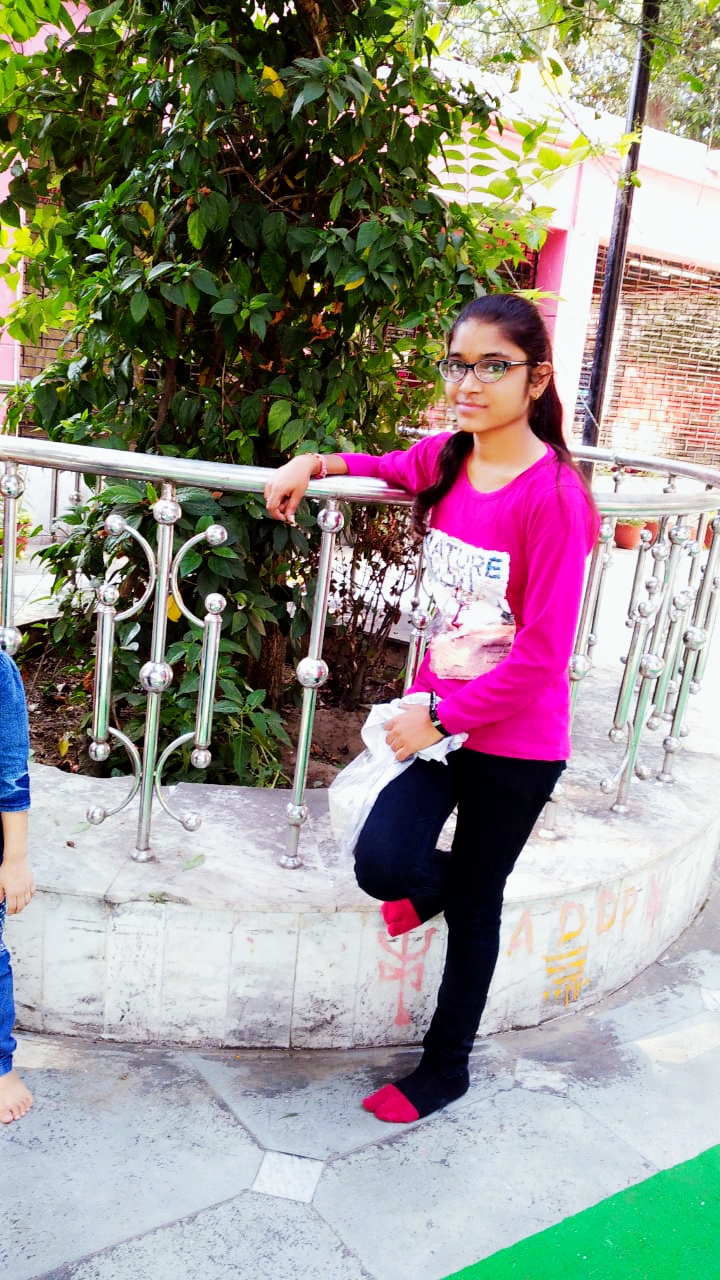 Dipali gupta Bhupendra Yadav Azhar Naseem Aman Kumbhakar Institutes where I have Applied
 Various InstitutesIisc bangalore. In IISc Interview, they have shortlisted the top 100 Gate rankers and they will give you the choice to attend interviews in either theoretical or experimental physics or you can opt for both. So, I opt for both. As my interview starts the first question was that Give a brief Introduction. Second is what have you prepared? Then they come to the physics part. There were some basic questions from quantum mechanics like from Simple harmonic oscillator problem and some solid state physics problem from topics like X-ray diffraction and superconductivity. They create new problems i.e. the one which among which you never came across. They are checking your approach. The interview duration was around 20 minutes. Interview Experience at Various IITsThere are certain ways in which your interview will be conducted. Suppose you choose Condensed matter physics at a particular IIT. Now in most of the IIT’s like Roorkee and Ropar they have the interview panel from that field only. So they are going to ask questions from Condensed Matter physics only. The interview duration was around 20 minutes. At IIT Guwahati, they asked me questions from Condensed matter physics, Statistical physics, Quantum Mechanics and one or two questions from classical mechanics. The interview duration was 30 minutes. At IIT Hyderabad there were very few (3-4) positions on the basis of GATE. They take most of the students who have qualified JRF exam. They also asked me to draw the curve. Some question from statistical physics and some from quantum mechanics. At IIT BHU, the interview duration was about 15 minutes. They are always going to ask you questions from X-ray diffraction in condensed matter physics. Written & Interview ProcedureFew of the IIT’s like IIT Kanpur and IIT Bombay, they take your interview once you qualify the written test. I have given the written test for both the institutes. The written test time duration for IIT-Bombay and IIT-Kanpur was 1 hour and 1 hour 30 minutes. The cutoff for IIT Bombay was quite high. This year IIT Madras they have not taken any written test, but although they asked oral questions and they also have prepared few slides where they ask me to solve the problem on my rough sheet and send them. They ask problem from core subjects like Electromagnetism, Quantum Mechanics and Classical mechanics. This interview duration was around 45 minutes. Interview Experience at various Research InstitutesAt JNCASR, I have applied in the CPMU department where both chemistry and physics students work. The number of seats is not higher. They take from 5-8 students in physics. They started the interview by asking me what you prepared in condensed matter physics. I tell them superconductivity and they ask me questions from superconductivity. The interview duration was about 20 minutes. - IISER BhopalThey started the interview by asking me to introduce and then they ask some questions from my project and then they ask more questions from Condensed matter physics and correlate it with Quantum mechanics. Interview duration was 20 minutes. - TIFR HyderabadIt is one of the best interviews that I faced so far. My interview was around 1 hour and 15 minutes. They are professional and decent. They started the interview in the same as the other institutes have done. Furthermore they have asked some everyday life questions also. - BARC-HBNI MumbaiThe interview was good. They started the interview from Statistical physics conceptual questions and then they go towards the electromagnetism. Then they go towards the condensed matter physics and one or two questions from nuclear physics. The interview duration was around 30 minutes. - IISER TVMThey basically ask questions from my project and some basic questions from quantum mechanics also. The interview duration was around 20 minutes. All the best to the Ph.D. aspiring candidates. Books to be followed Call or Whatsapp me +91 8447053310 or 8921060139Or send me a message by filling the form below. What is : (1+4+2+1+2)*1 = Get the Reddit appA subreddit dedicated to PhDs. [Advice] I just got an interview for my PhD application what should I expect?I just got an interview for my PhD application and wondering what exactly am I supposed to prepare for? TIA. By continuing, you agree to our User Agreement and acknowledge that you understand the Privacy Policy . Enter the 6-digit code from your authenticator appYou’ve set up two-factor authentication for this account. Enter a 6-digit backup codeCreate your username and password. Reddit is anonymous, so your username is what you’ll go by here. Choose wisely—because once you get a name, you can’t change it. Reset your passwordEnter your email address or username and we’ll send you a link to reset your password Check your inboxAn email with a link to reset your password was sent to the email address associated with your account Choose a Reddit account to continueA Site for Higher Mathematics PhD & JRF Position Interview Asked Questions & Experiences(Collections)Here we have shared some of the Interview Questions asked in PhD Exams, the Experience of Candidates and their Suggestions. Hopefully, this page will be helpful for you in your preparation for PhD Interviews & Exams. This piece of information is shared only for educational purposes. We request all of you, if you have recently appeared in a Ph.D. interview or Assistant Prof. Interview or JRF Position Interview, please share your Interview Que. /Experience /Suggestions to us for others’ benefit, Your little contribution can help New aspirants to prepare themselves. Send your interview Que/Videos us on [email protected] . Subscribe Us On Page Editor: P Kalika YouTube Playlist of PhD Interview Experiences/suggestions: https://www.youtube.com/playlist?list=PLDu0JgProGz4Bnzvq7sRfEsklmGivnkay ❤️ We hearty thanks to those persons who shared their Interview Questions & Experiences for others’ help. We wish you all the best for your future. 🎯 IISER-Thiruvananthapuram iPHD Interview Questions (Shared by Shakir Bashir, June 2024) . (Added on July 08, 2024)  🎯 Interview Ques Asked at IITs (Shared by Swaraj Koley)  🎯PhD Admission Interview Ques (Anonymously shared, May 2024) . I have attached my interview questions of Autumn session of 2024, my topic of interest was Differential equation (ode and pde).  🎯 ISI Phd Math Jrf Interview Ques (Anonymously shared, October 2023) . I have recently qualified Sikkim Manipal University Phd interview (Reshav Bhatarai).  (Added on March 31, 2024)
🎯 Ques asked at IIT Delhi PhD Interview (Shared by Jasveen Kaur , August 2023) .
🎯 Interview Experience of ISI M.Math at ISI Bangalore (Shared by Anonymously , July 2023) . (Added on March 31, 2024 ) I was asked my preference and I replied with Basic Analysis and Algebra. They asked me two questions, one from Analysis and the other from Algebra. They sufficiently helped me by providing hints along the way. I’m attaching the asked questions.  🎯 Interview questions in NBHM, TIFR-CAM, IISER TVM (through NBHM channel), and NISER (Shared by Drishti Sunder Phukon , June 2023) . Sir, I would like to submit interview questions in NBHM, TIFR-CAM, IISER TVM (through NBHM channel), and NISER so that it would help others. Please find attached the pdf of the same. I got selected for NBHM masters scholarship, and waiting for results from IISER TVM and NISER. 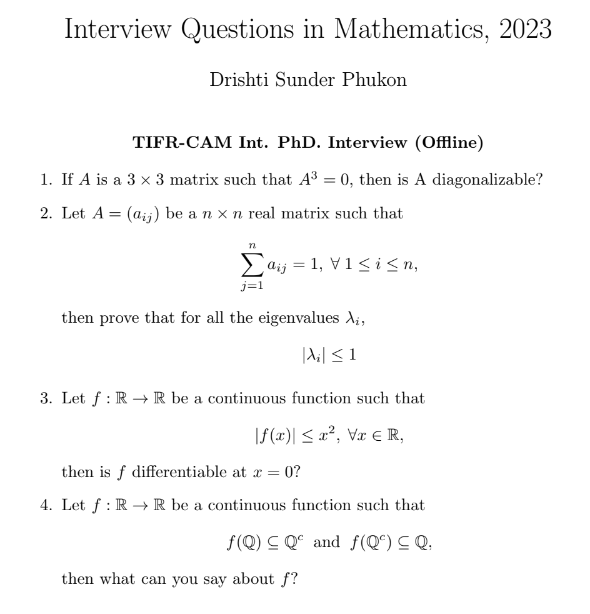 🎯 IIT Kanpur Phd-Interview Question (Shared by Surajit Pal, May 2023 ) . 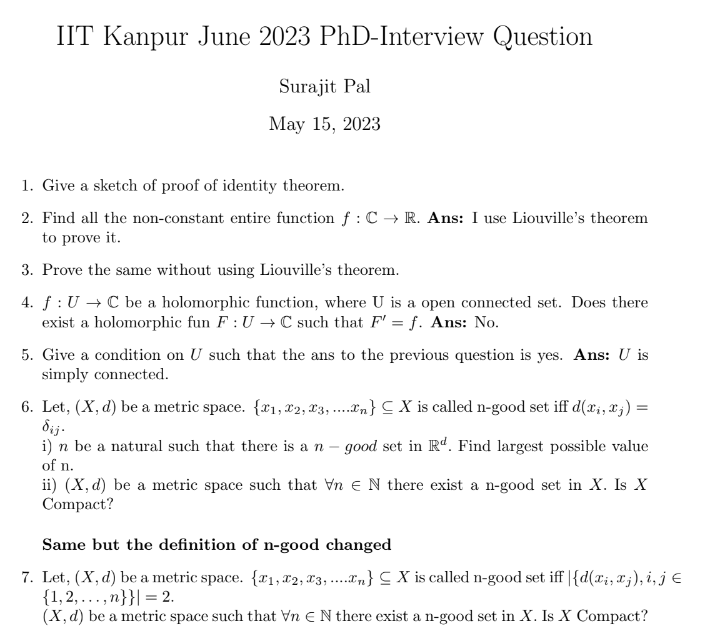 🎯 PhD Interview questions asked at IIT Ropar (Shared by Bikky Gupta) . (Added on May 06, 2023) “Last I got a mail from IIT Ropar I selected in Phd program, your collection of question give me idea how to prepare for interview, Thank you so much from bottom of my heart. I have question that they ask during my interview. I am attaching here. 🎯 PhD Interview questions asked at IIT Bombay, Kanpur, Jodhpur, Hyderabad, Madras & IISER Pune (Shared by Anik Bhowmick) . ‘I am Anik Bhowmick, I have appeared in several PhD interviews this year. I have attached a pdf so that you can share it and help students around the world.’ (Added on May 05, 2023) 🎯Interview questions asked at IIT Bombay, Kanpur and NBHM PhD (Anonymously received) . (Added on 18-12-2022) 🎯Interview questions at IISER Pune and IIT Guwahati (Anonymously received) . I had given an interview at IIT Guwahati and IISER Pune in the June session. In IISER Pune, they asked questions from linear algebra, ordinary differential equations, real analysis. They are as follows.
During IIT Guwahati, they asked questions from partial differential equations.
(Added on 30-07-2022) 🎯 NBHM PhD 2022 Interview Questions shared by Bittu Singh . 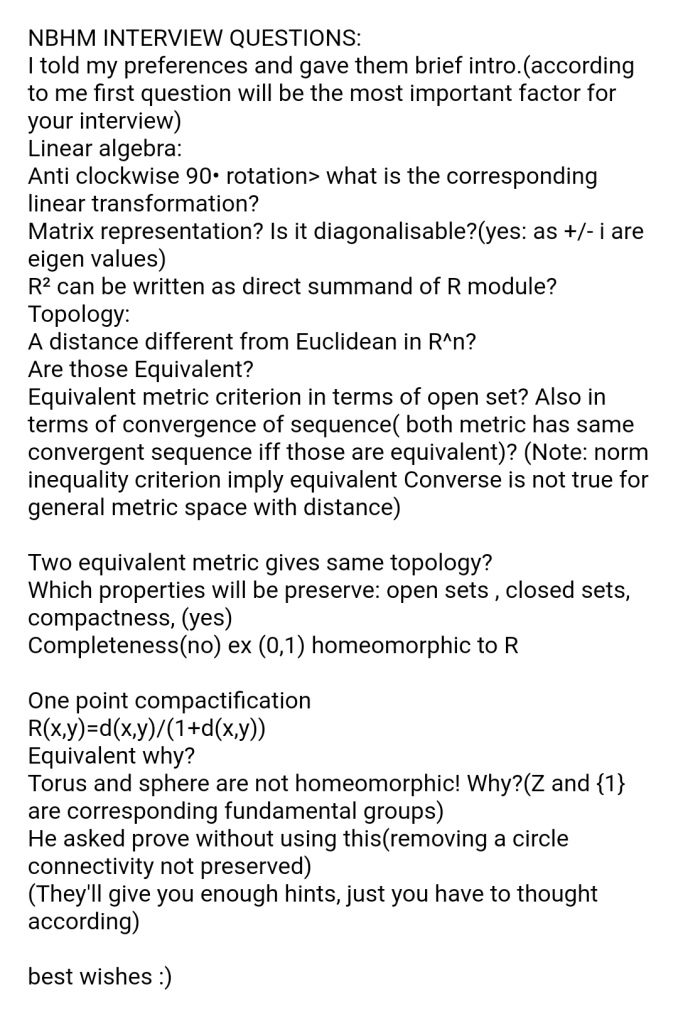 🎯 CMI PhD Interview experience (Anonymously Shared) 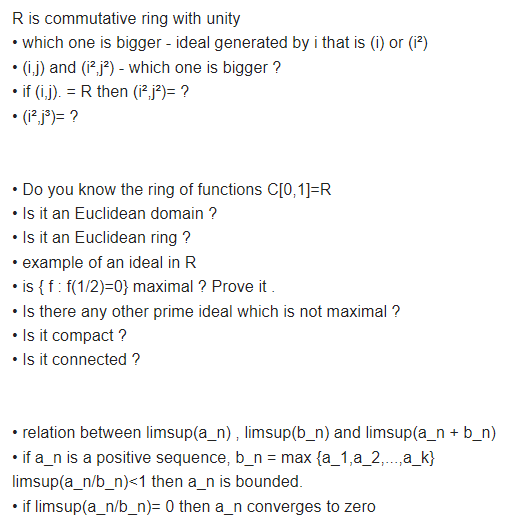 🎯 IISER Pune PhD 2022 July Interview questions shared by Umesh 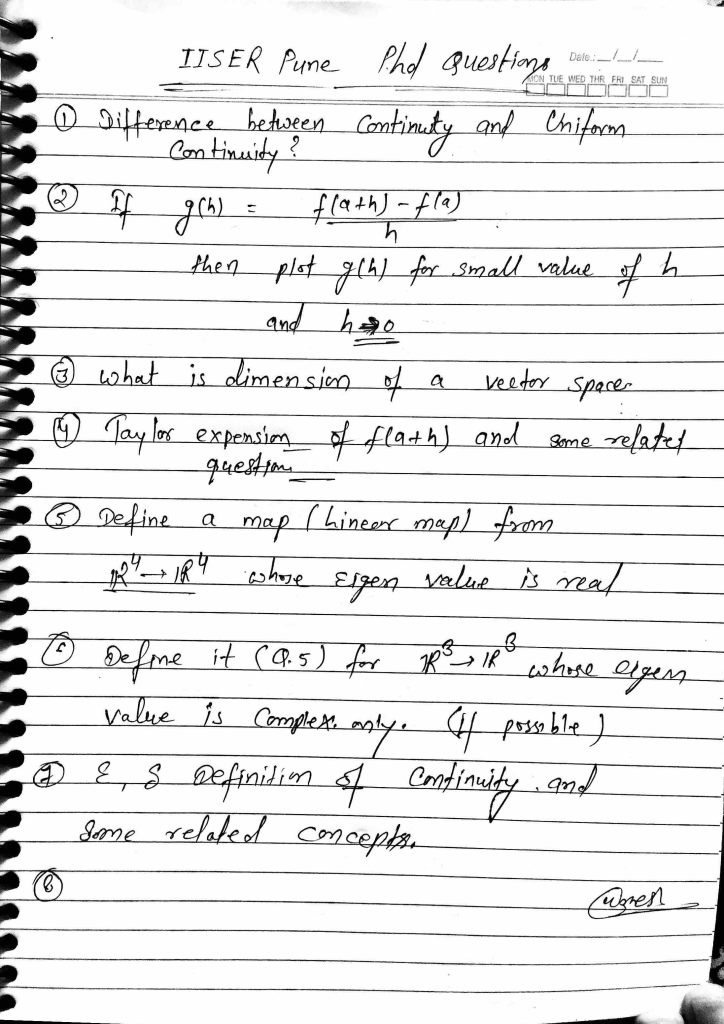 (Added on 04-07-2022) 🎯 PhD Interview/Admission Questions IITB, IITK & IITM (04-07-2022) (Anonymously Shared) 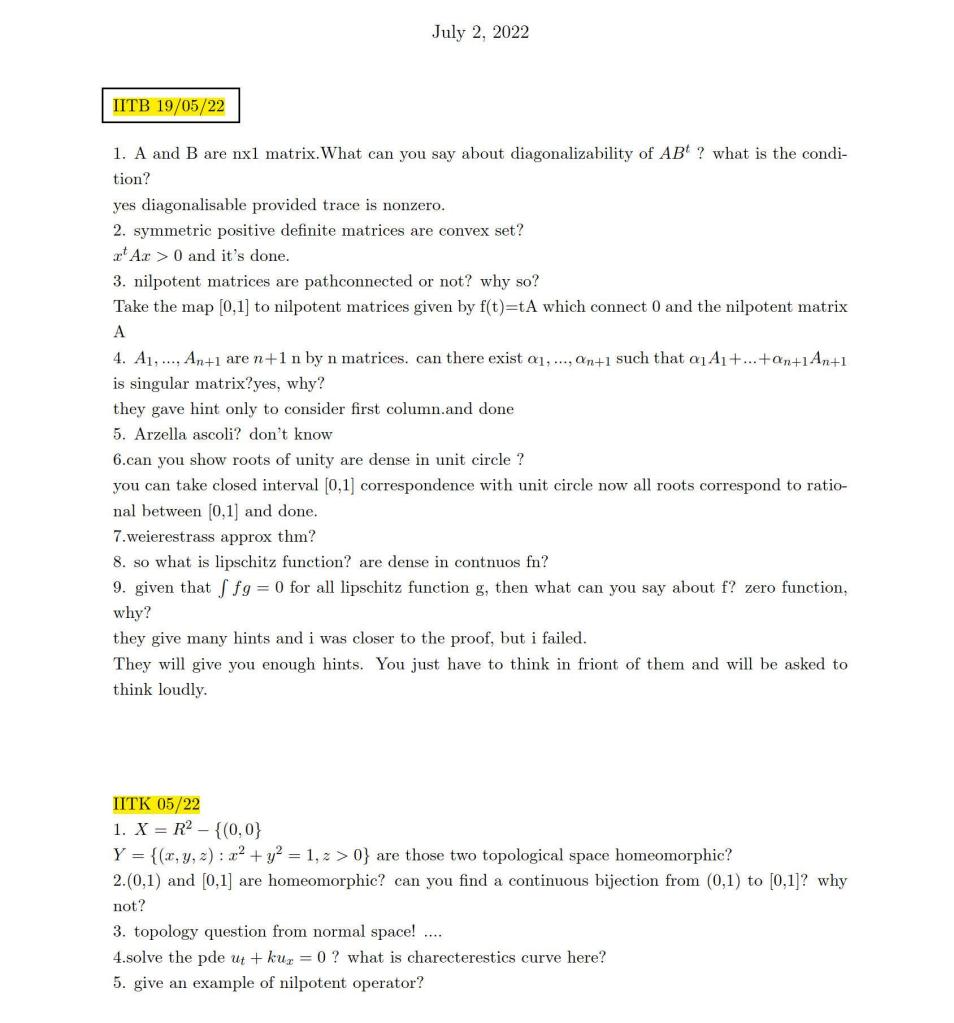 IIT Madras Que. 🎯 Hello, Sir, Sending PhD interview questions of IISER Bhopal, IIT Indore and IIT Hydrabad. 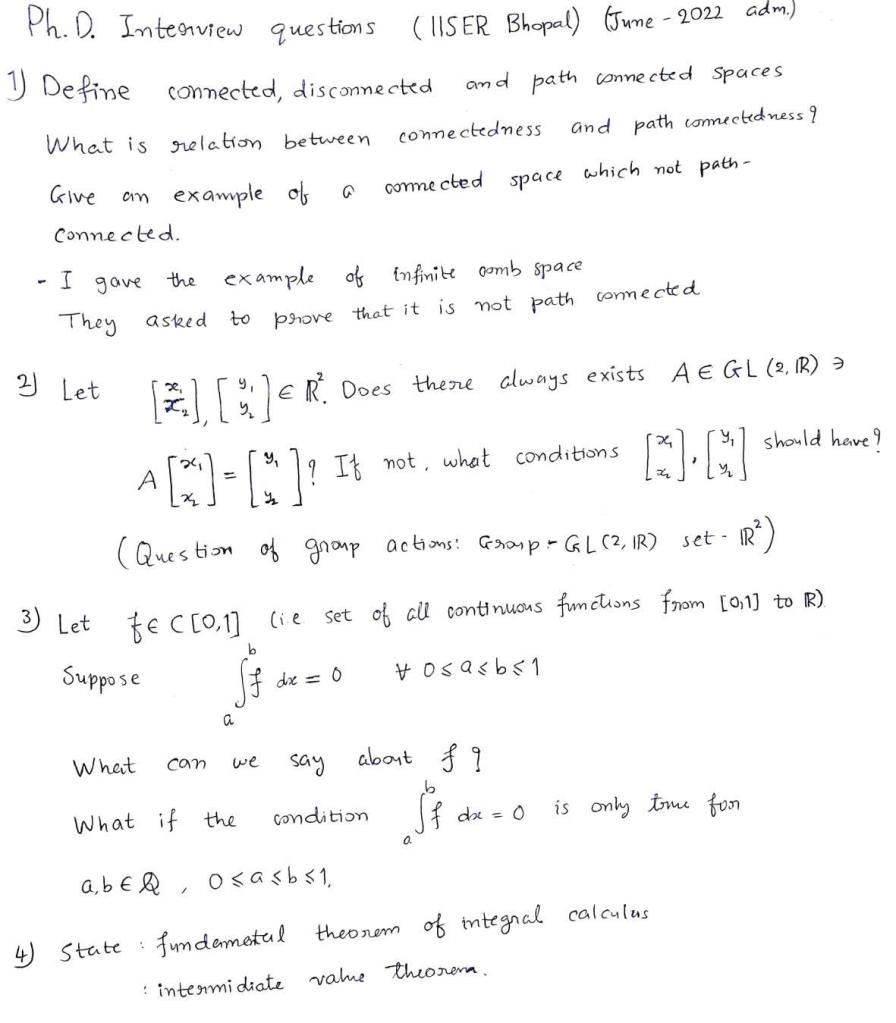 (Added on 28-05-2022) 🎯Hello ! I attended the PhD interview at IIT Dharwad this year. I’m sharing the questions below. (Anonymous Shared)
🎯 PhD test and interview questions collection shared by Nidhi Shukla, Download the PDF file (17Pages). SNU PhD test
PhD Interview at IITs, IISc, IIPE, etc. Download PDF File: Click here 🎯 TIFR Mumbai PhD Interview April 2022 Questions Shared by Dhiman Das. 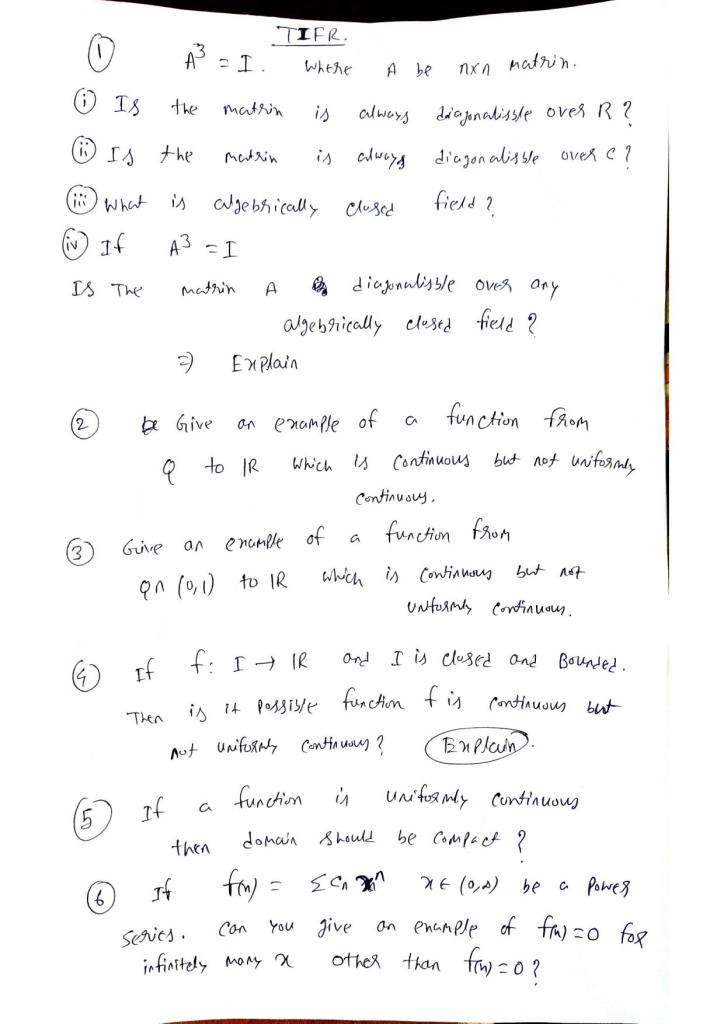 (Added on 07-04-2022) 🎯 Hello Sir, I am selected for PhD at Aligarh Muslim University. I thank you for all the updates and notes and videos. Sharing my interview questions. Pls keep anonymous. Thank you again for running the kalika community. 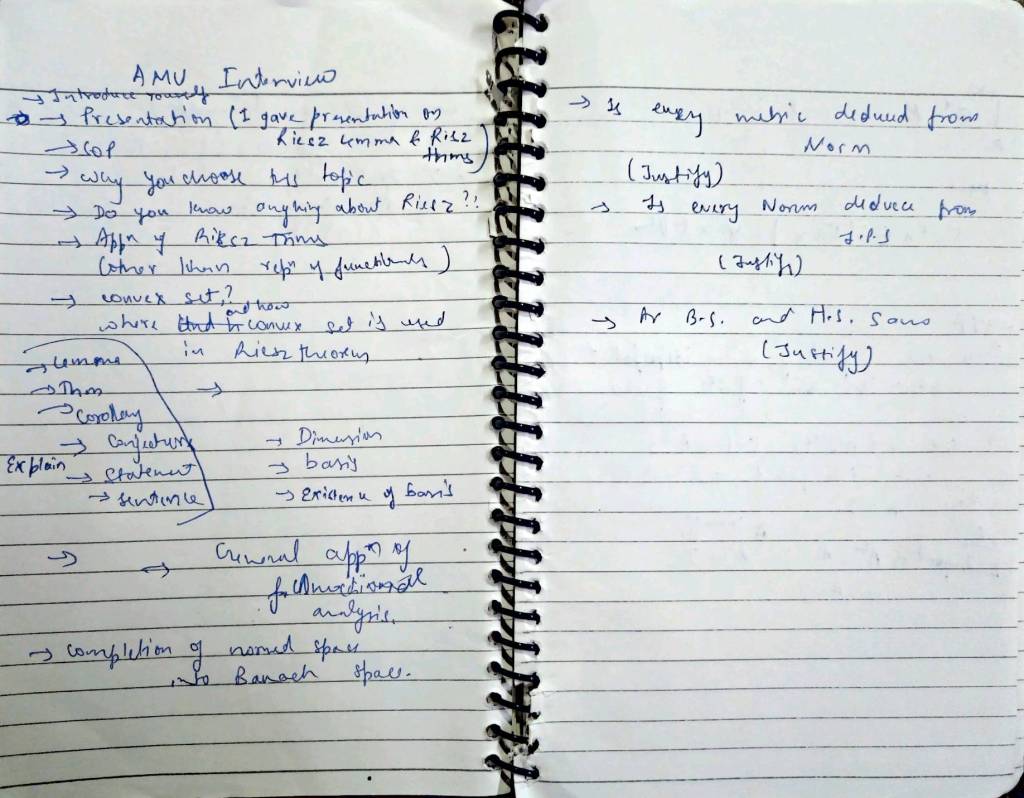 (Added on 30-12-2021) 🎯 PhD Interview 2021 Questions asked at VIT Bhopal Sir, I have appeared for an Interview for VIT Bhopal on 8th december and also got selected. I am attaching the file of questions here. Also big thanks to you sir as the collections of interview questions is very helpful for me. and also I am following your study material of many topics for preparing for CSIR & GATE. Regards Suneel Kumar 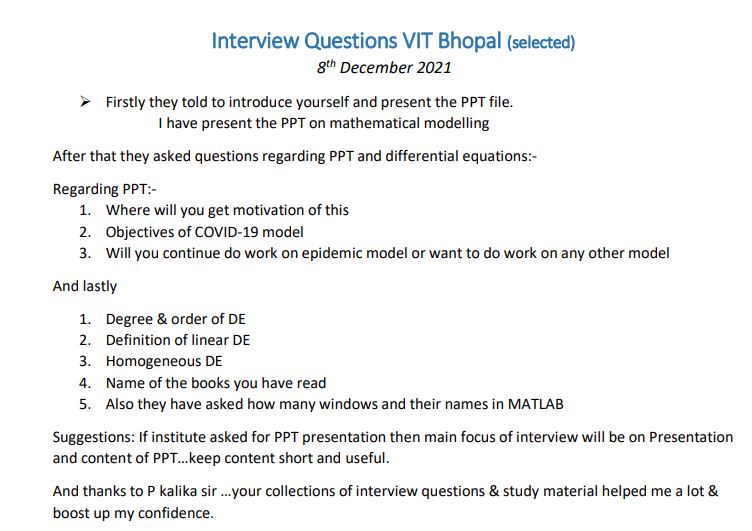 🎯 PhD Interview 2021 Questions asked at UNIVERSITY OF DELHI Hey, I have given Interview at UNIVERSITY OF DELHI. The interview questions are follows: First we have to make a presentation on any of our favourite topic in not more than 8 minutes. My topic was “Fundamental Theorem of Finite Abelian Groups” The questions asked are as follows: 1) What are elementary divisors? Give an example. 2) Given two finite Abelian Groups G and H. How can we check whether they are isomorphic or not with the help of elementary divisors? 3) What are the future plans that you would like to work with the theorem that you presented? 4) What is the partial converse of Lagrange theorem for Non-Abelian groups that we have from “Fundamental Theorem of Finite Abelian Groups”? 5) How many groups upto isomorphism are there of order 15? 6) What is Cauchy theorem? 7) With the help of Sylow theorem, show that the group of order 15 is Cyclic? 8) Do you know Free Abelian group? 9) What is Commutator group? 10) What are the derived series? 11) With the help of derived series can we define Solvable group? 12) What is Characteristic subgroup? 13) Relation between Characteristic subgroup and Normal subgroup? 14) Why is every characteristic subgroup normal? 15) What is the Commutator subgroup of GL_n(R). Why? 🎯 PhD Interview 2021 Questions asked at IISER MOHALI Hey, I have given an interview at IISER MOHALI. The questions are as follows: 1) What is the unit group of Z_n? (in terms of n) 2) What are the maximal ideals of Z? (I said of type pZ where p is prime) 3) Prove that Maximal ideals of Z are only of type pZ where p is prime? 4) Consider the complex polynomial ring C[x]. What are its irreducible elements? What are its maximal ideals? 5) Consider C[x,y], what are its maximal ideals? 6) Are the ideals <x-a> and <x-b> in the ring C[x] same? For what condition on ‘a’ and ‘b’ will they be same? 7) Is the space L²[a,b] a Hilbert space? 8) Consider [0,1]. As every point in [0,1] can be written in decimal expansion. Consider the set of all points in [0,1] whose decimal expansion do not include the number 5. What is its measure? (Added on 17-12-2021) 🎯 VIT VELLORE PhD Interview 2021 Questions Me Nowshad Ali Mir from Jammu and Kashmir. I have appeared for interview on 20th of Oct, 2021 at VIT VELLORE. INTERVIEWERS asked me simple questions:
🎯 IIT Kanpur, Madrash, BHU & IISER Berhampur PhD Interview Dec 2021 Questions (Anonymous Share) (Added on 10-12-2021) My Name is ———— and I got selected in PhD at IIT Madras for 2022 January session, Here I am attached the following interview questions of mine. Click on the link to read. 🎯 IIT Kanpur PhD Interview December 2021 Questions (Anonymous Share)
🎯 IIT Bombay PhD Interview Dec 2021 Questions (Anonymous Share)
🎯 IIT BHU PhD Interview Dec 2021 Questions (Anonymous Share)
(Added on 01-12-2021) 🎯 IIT Kharagpur PhD Interview 2021 Questions (Anonymous Share) “ Thank you sir for your effort for making us available such questions!” The interview was for 30 mins. Area of interest: graph theory. 1st 10 mins, they show the 1st 5 questions which I had to solve in 10mins. Next few questions they asked verbally. Note: These are the memory based questions. Some small differences may be there.
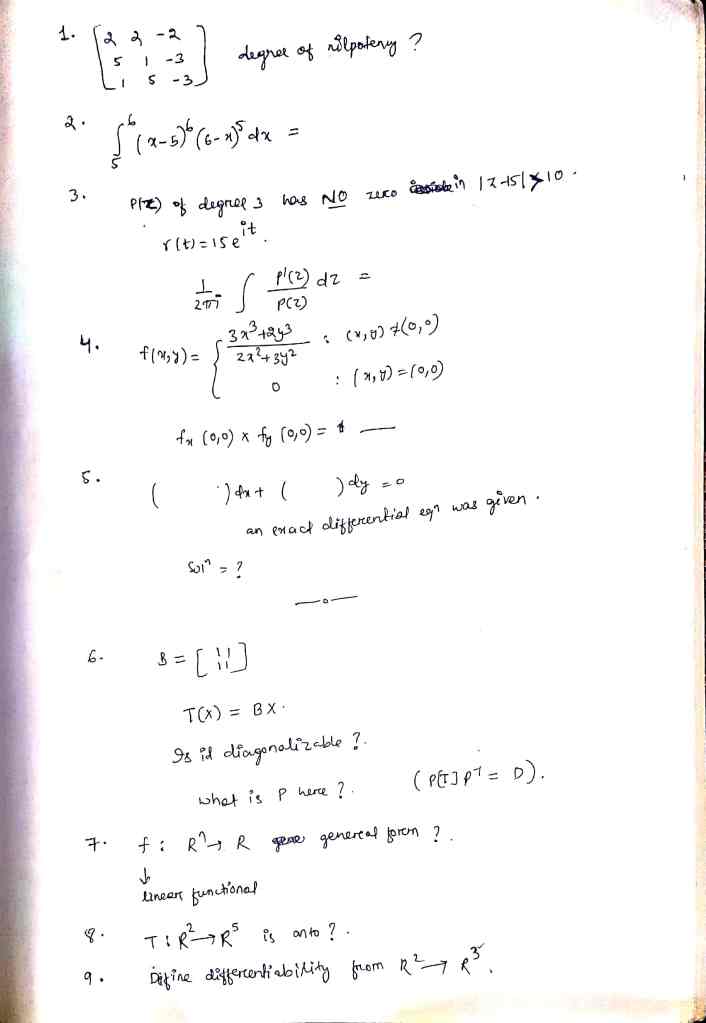 🎯 IISc Banglore PhD Interview 2021 Questions (Anonymous Share)
(Added on 24-11-2021) 🎯 NBHM PhD Interview 2021 Questions (Anonymous Share) (This Student got selected in NBHM ). I am very thankful to Mr. P kalika sir. Your videos helped me a lot. 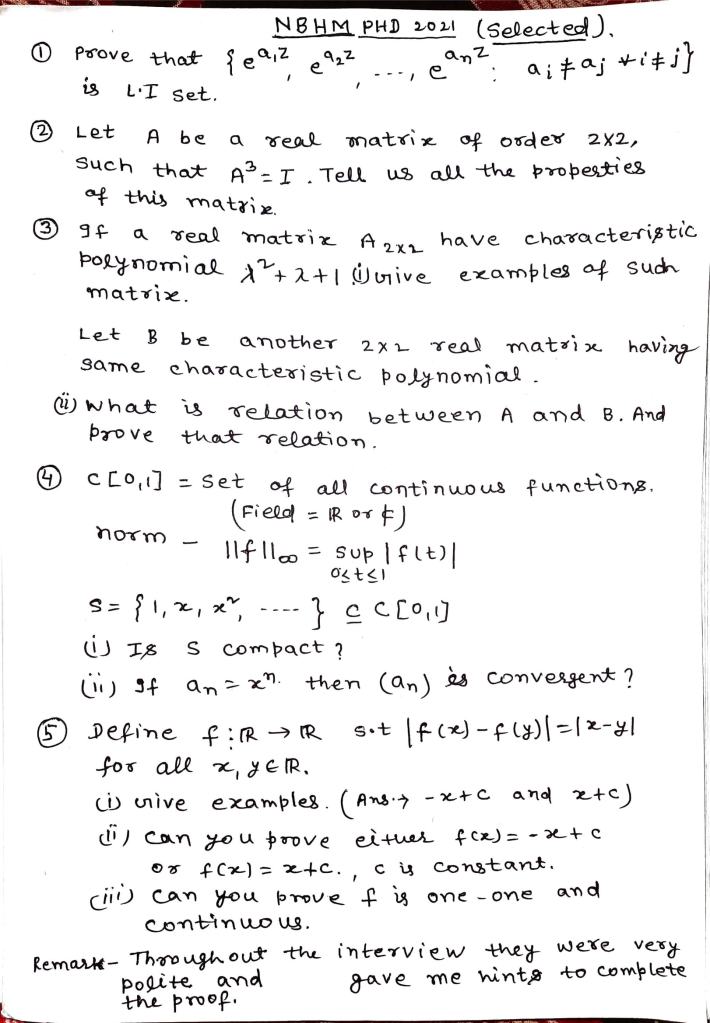 🎯 Interview Questions for PhD Admission at IIT Hyderabad (Anonymous Share). 1) Tell us about your favorite theorem in Linear Algebra. Prove it. Why do you like it? 2) What is the Characteristic Polynomial of a matrix? 3) What is the Rank of the matrix? How do we find it? 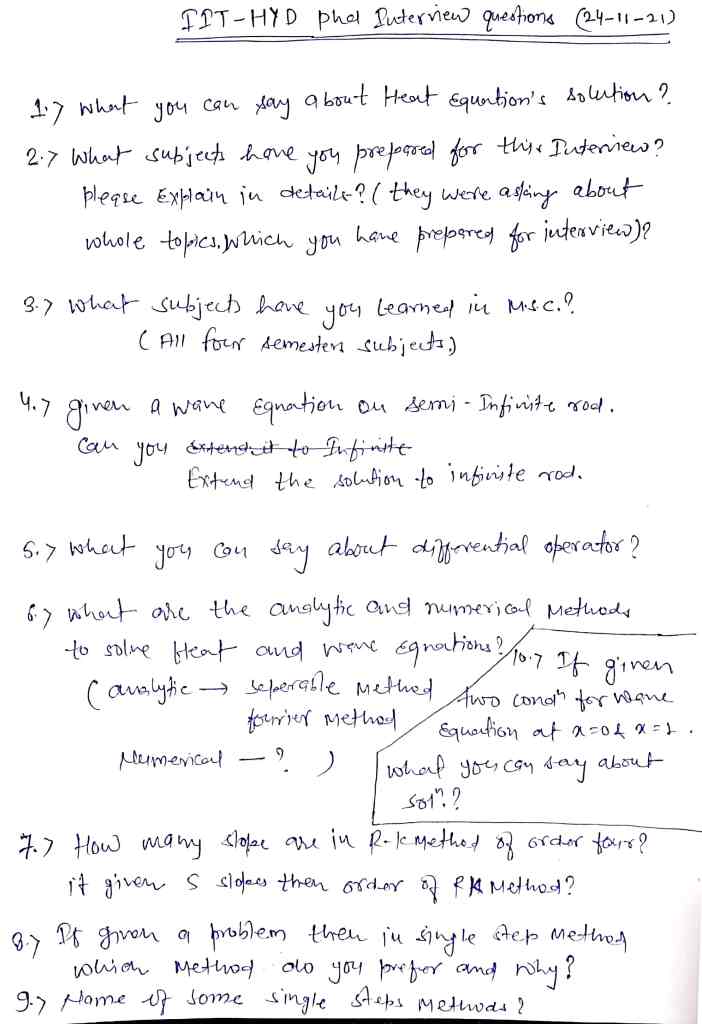 (Added on 19-11-2021) 🎯 Interview Questions for PhD at IIT Jodhpur dated 18-11-2021 (Anonymous Share). 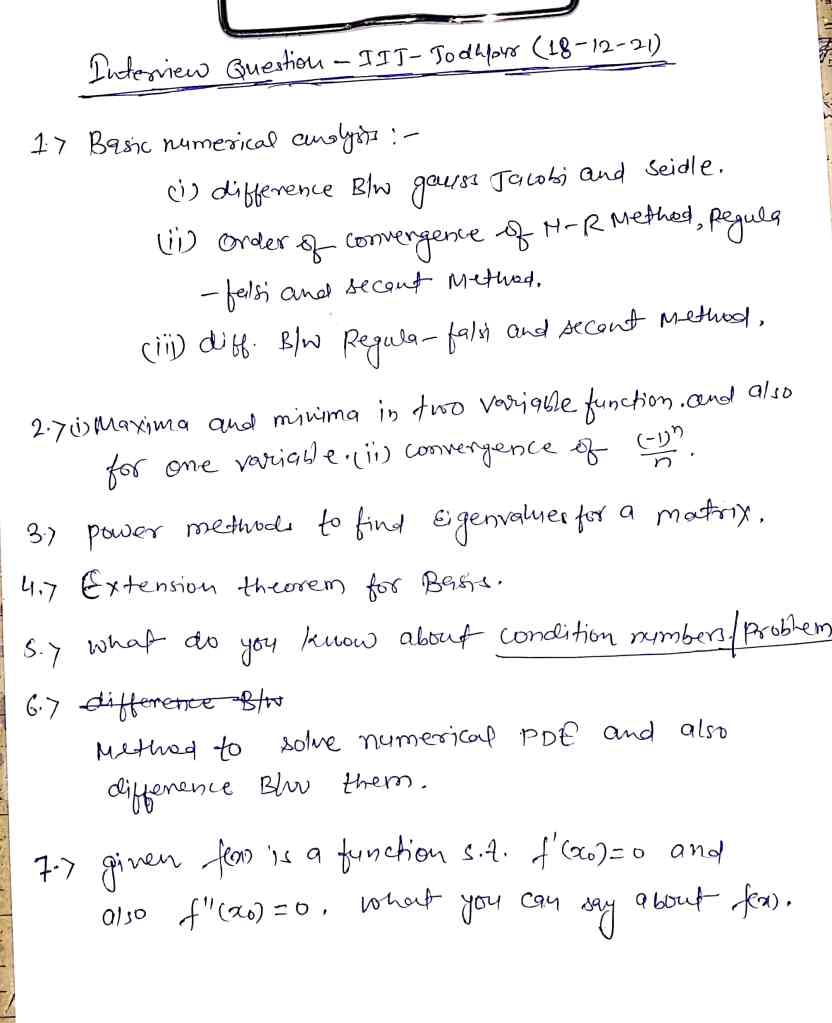 🎯 NBHM PhD Scholarship 2021 Interview Questions (Anonymous Share) (This Student got selected). (Added on 07-11-2021) 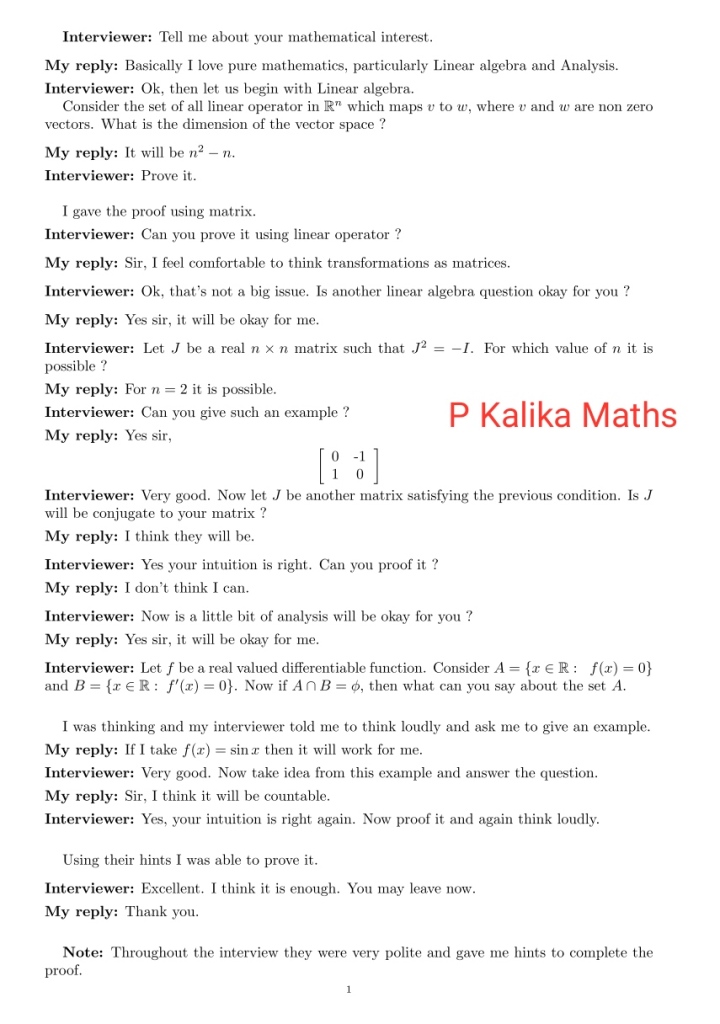 🎯 NBHM Phd Scholarship 2021 Interview & IMSc Phd Admission 2021 Interview Questions (Anonymous Share) (This Student got selected in NBHM ). (Added on 22-10-2021) I have appeared for BITS Pilani Interview and have been selected in it as well. I don’t remember the questions, but they were just 3-4 and one of them was what is the Nilpotent Group? Interview was very easy. I have also appeared for the NBHM Phd Scholarship Interview and have been selected. The questions are as follows:
I have also appeared for IMSc Phd Interview . The questions are as follows:
🎯 Some memory based ques from today’s DUET Mphil/PhD exam. (Shared by Kirandeep Kaur ) (Added on 04-10-2021) Download PDF 🎯 Hello sir recently I experienced NBHM PhD interview and sending my interview questions here. (Shared by Parna Saha) (Added on 22-09-2021) First they asked my preference and I said abstract algebra. Then they asked two questions from the nbhm phd written test. One is prove the formula ” number of idempotent elements in Zn = 2^d” And another one from linear algebra and I answered the question in written exam wrong but still they said to try there… Then they ask
Suggestions: If you are appearing nbhm interview try to read the proofs of the formula we generally use and prepare your nbhm exam questions..all of them And whatever your preference can be…they ask question from real analysis and topology. 🎯 I am attaching here pdf of questions asked in PhD interviews at IIT, IIIT, and IISER. These are collection of questions based on my experience of one year (Shared by Divya ). (Added on 21-09-2021)\ Download PDF shared by Divya: Click Here 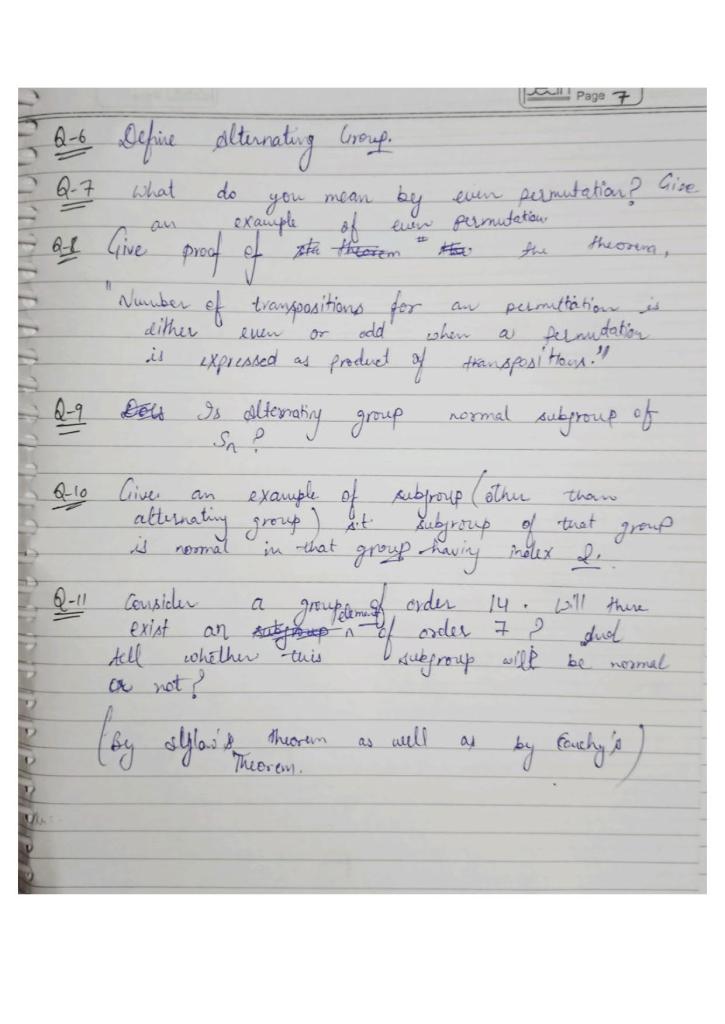 🎯 Hello here is the question of PhD interview University of Calcutta (Ballygunge Science College) pure Mathematics (Shared by Amitabha Bhattacharya ) (Added on 21-09-2021) 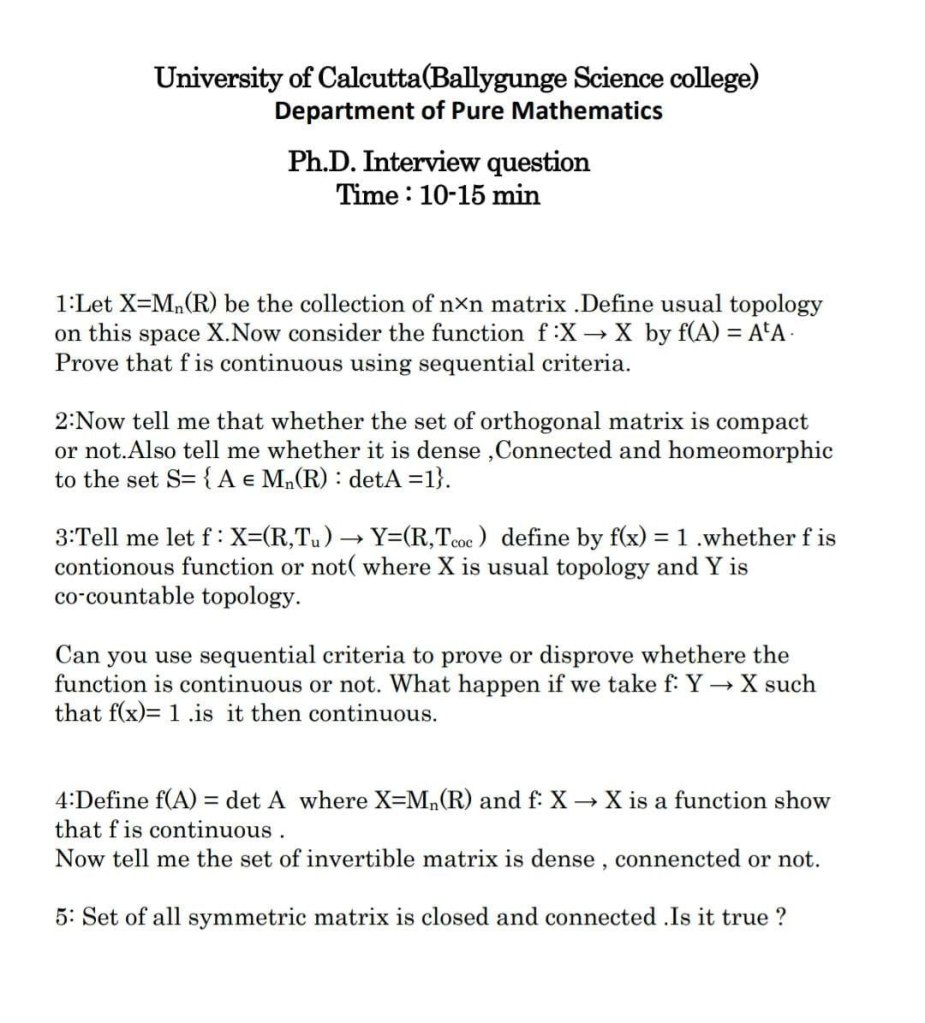 🎯 IISER Mohali PhD Interview 2021 Questions (Anonymous Share) (Added on 08-08-2021)
🎯 IIIT Delhi PhD Interview 2021 Questions (Anonymous Share)
🎯 NIT Patna PhD Interview 2021 Questions (Shared by Soubhik Paramanik ) (Added on 31-07-2021) 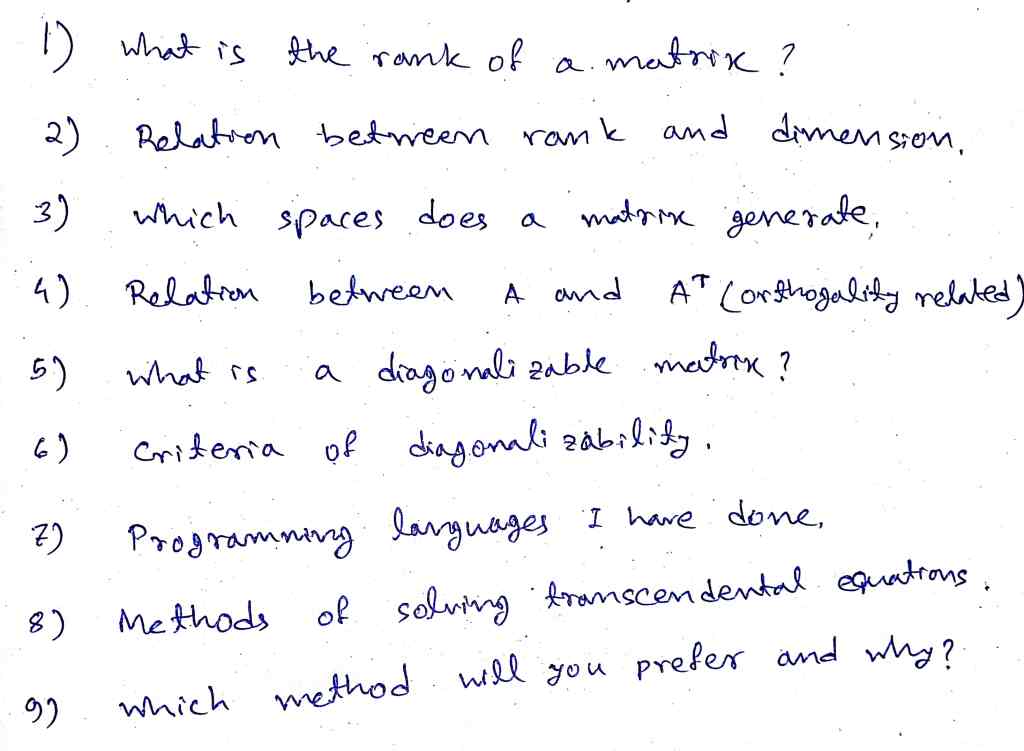 🎯 NIT Allahabad PhD Interview 2021 Questions (Anonymously Shared ) (Added on 26-07-2021)
🎯 IIT INDORE PhD Interview 2021 Questions (Anonymously Shared ) (Added on 23-06-2021)
🎯 IIT Bhubneswar PhD Interview 2021 Questions (Shared by Radhanandan Mandal ). 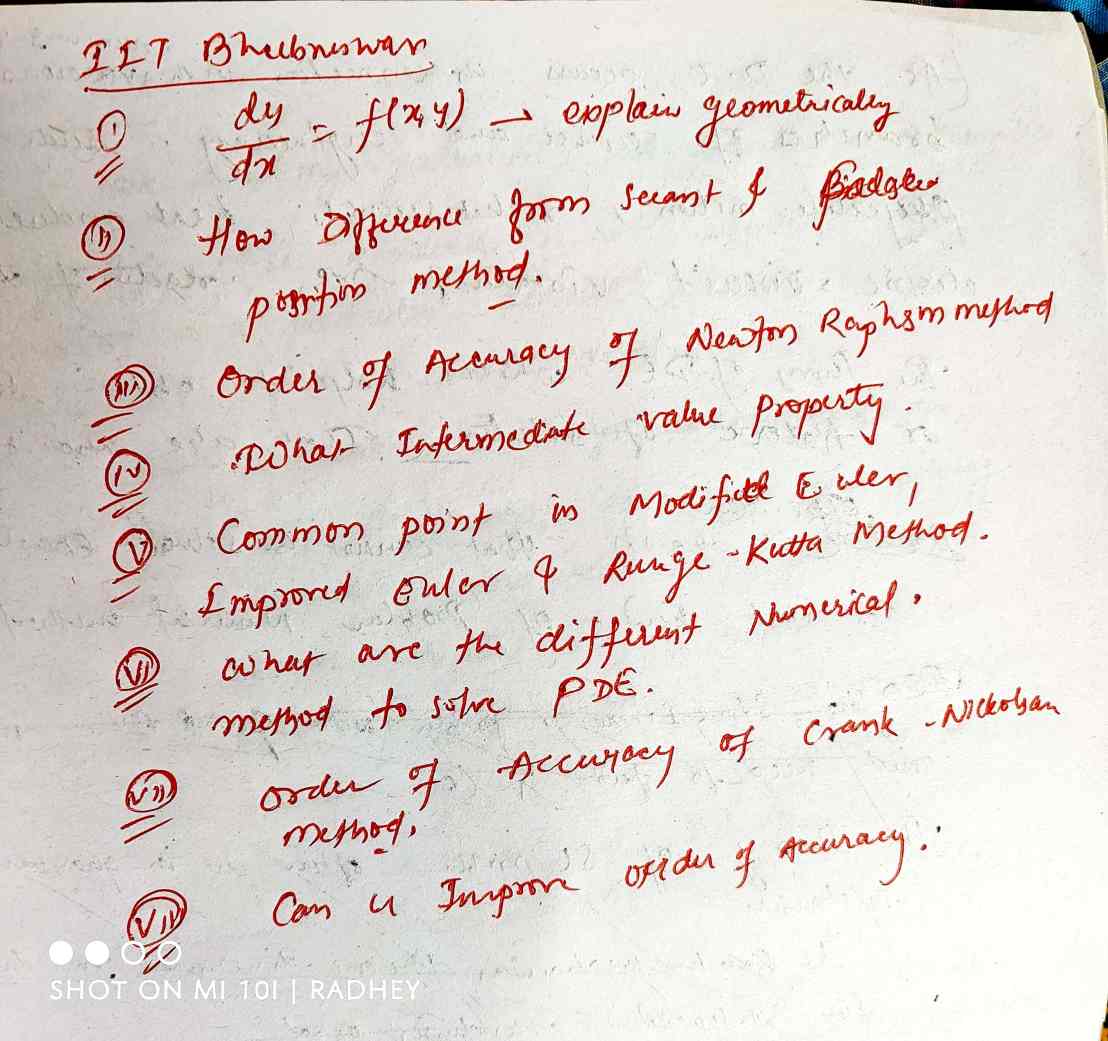 🎯 IIT Jodhpur PhD Interview 2021 Questions (Anony mously Shared ) (Added on 16-06-2021)
🎯 IISc Bangalore PhD Interview 2021 Questions (Thanks to Lalbahadur Sahu ) 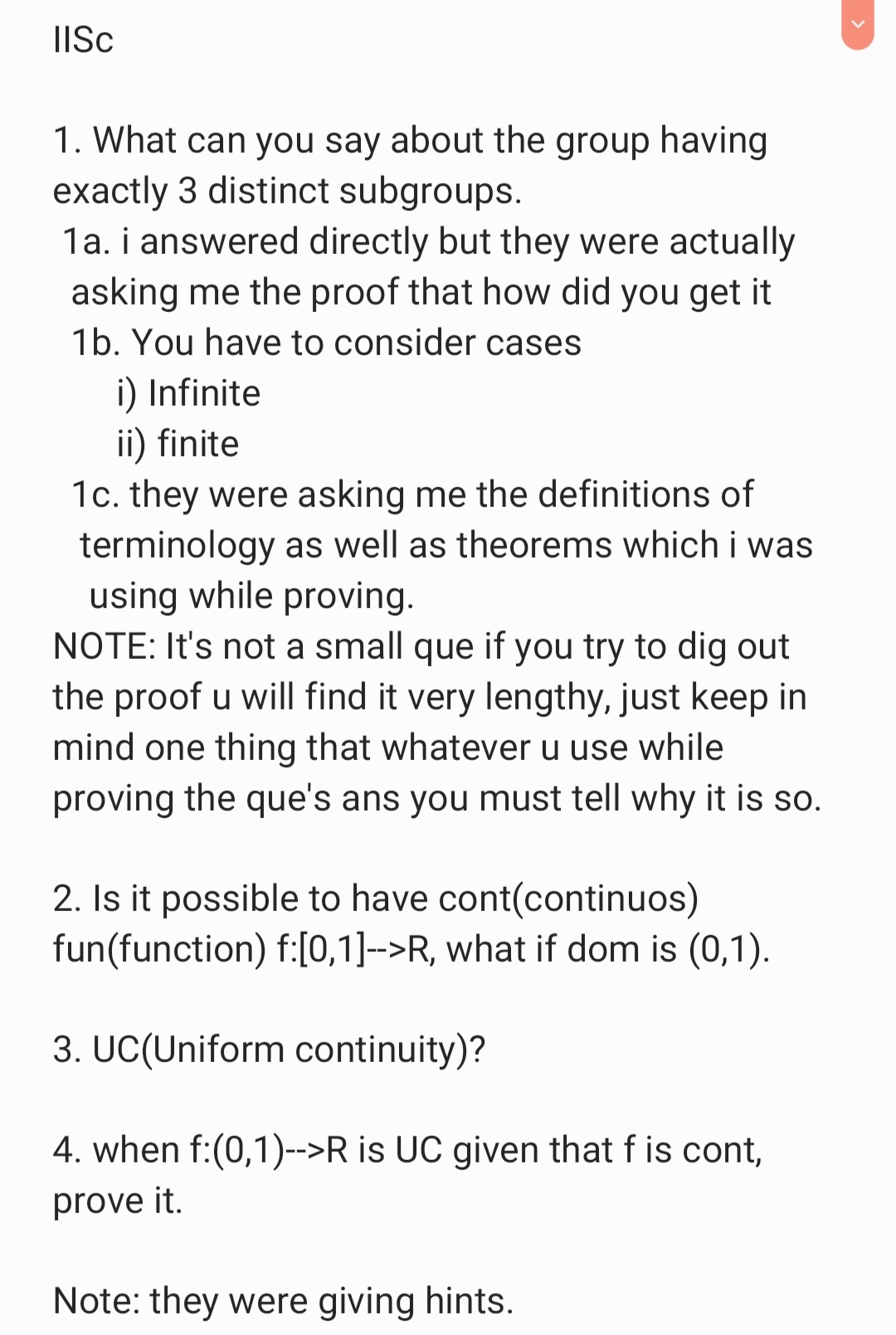 🎯 IIT Mandi PhD Interview 2021 Questions (Anonymously Shared ) (Added on 15-06-2021)
Email Address Subscribe Us 🎯 IIT Delhi PhD Stage-1 Interview 2021 Questions (Anonymously Shared ) 🎯 Anonymously Shared – 1
🎯 Anonymously Shared – 2
🎯 Anonymously Shared – 3
🎯 Anonymously Shared – 4 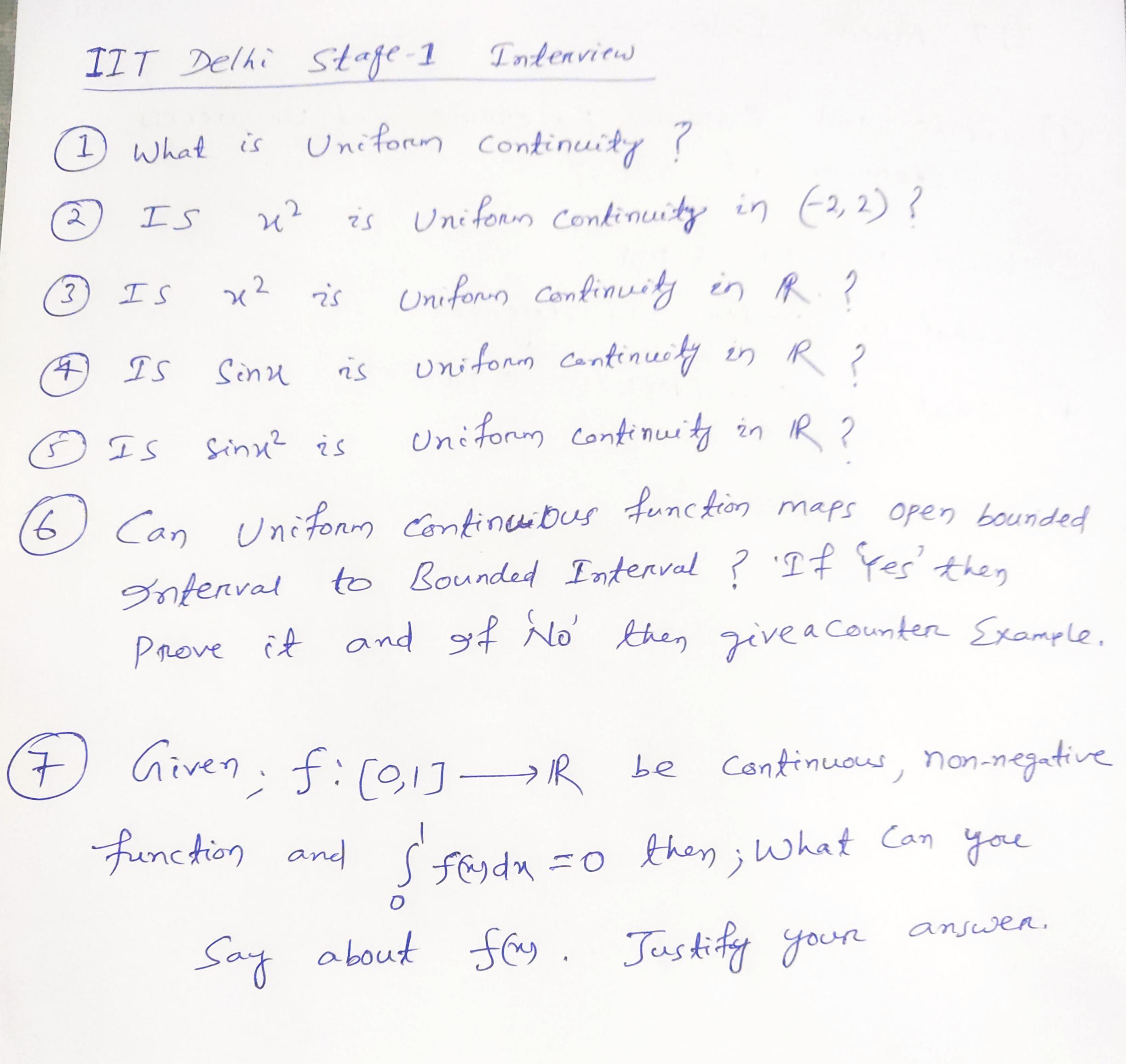 🎯 Interview Questions for PhD Admission 2021 at IISc Bangalore ( Shared By Sayan Roy ) (Added on 12-06-2021) 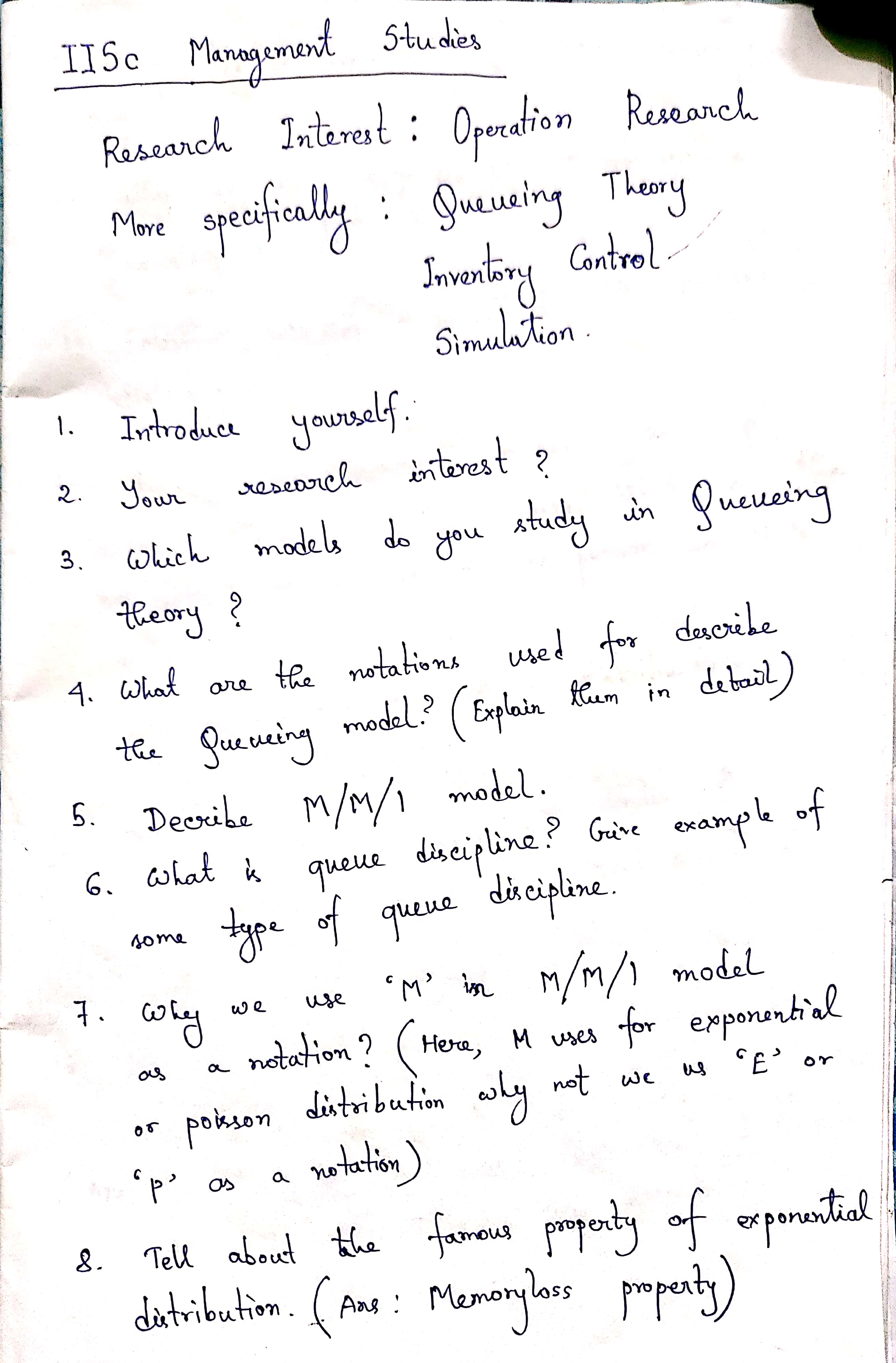 🎯 Interview Questions for PhD Admission 2021 at IIT Hyderabad (Anonymously Shared ) (Added on 11-06-2021) I have given an online PhD Interview for IIT Hyderabad. The questions are as follows:
🎯 Interview Questions for PhD Admission 2021 at IISER Kolkat a (Anonymously Shared ) (Added on 10-06-2021)  🎯 PhD Admission 2021 IIT Delhi interview quest ion… ( Shared by Sandeep ) (Added on 09-06-2021) 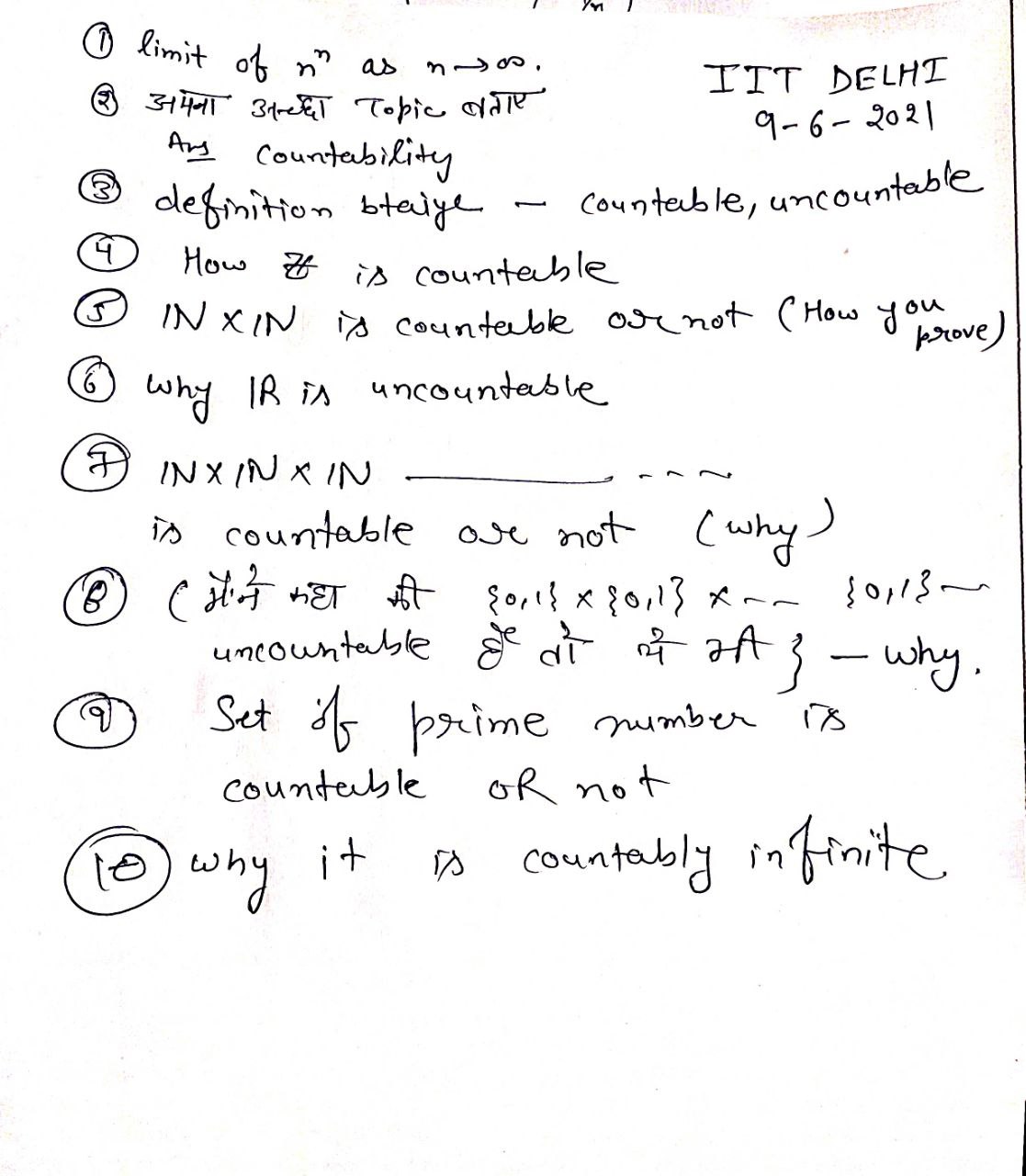 🎯 PhD Admission 2021 IISER Kolkata telephonic interview questio n… (Anonymously Shared ) (Added on 08-06-2021)
🎯 PhD Admission 2021 Interview Que. Asked at IIT Mandi ( Shared by Dhiman Das ) (Added on 28-05-2021) ● sir maine linear algebra and pde mai interview diya ◆ linear algebra se eigen vector defination ◆ null vector eigen vector ho sakta hai kiya ?? ◆ diagonalisibility se and A*A’ diagonalisble or not ase question kiyaa ◆ pde se classifiacation se kuch question kiya ◆ and heat wave de almbert se question kiya sir 🎯 PhD Admission 2021 interview Que. Asked at IIT Kharagpur (Anonymously Shared )
📚 (Suggestion) 👉🏻 Questions asked are easy so one has to be clear about all fundamentals while preparing for interview. 🎯 PhD Admission 2021 interview Que. Asked at IISc Banglore ( Shared By Sandip ) One of my friends give interview(today) in iisc bangalore for integrated phd.. 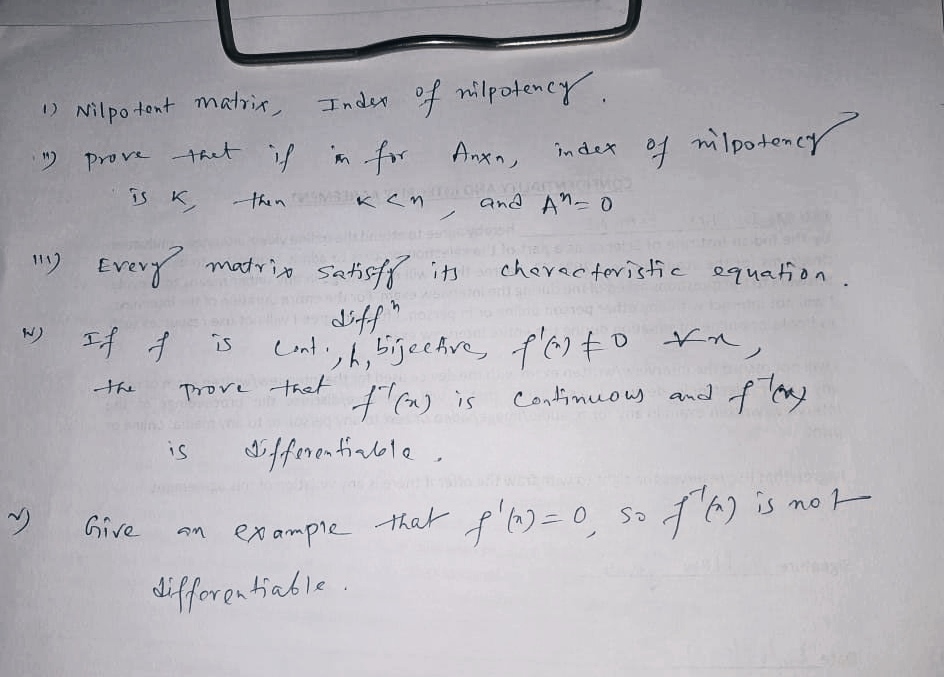 🎯 PhD interview questions Asked at IIT Mandi ( Shared by Manisha Agarwal) (Added on 25-05-2021)
📚 Their Suggestions… Sir please try to cover latex and mtlab computer applications which we require in phd interview…try to cover as soon as possible. As they ask that do u know any computer applications like latex and matlab I think it is also one of the factor so that anyone got selection or not 🎯 PhD interview questions Asked at IIT Guwahati (Topic: Real Analysis) ( Shared by Harinand Singh)
📚 Their Suggestions … This was my first interview, According to me, jisme intersted h us topic ko ache se taiyar kre aur basic bhi. Maine unhe ode bola but O bole kisi aur me interested h to maine real bola O bs real se hi Sare question puche aur thodi bahut help bhi krte h 🎯 PhD Interview Questions Asked at IIT Mandi (Topic: PDE ,& ODE ) ( Shared by Shadhank ) I have appeared in IIT Mandi PhD interview. The questions were from topic PDE & ODE. The questions were as follows:
🎯 Some of the PhD Interview Questions that were asked to me in the academic year 2020-2021. The interviews were held online ( Anonymously Shared ) (Added on 10-05-2021) Interview Questions in IIT Delhi.(Round 1)
Interview Questions in IISER Kolkata.(Round 1: Telephonic)
Interview Questions in IISER Kolkata.(Round 2: Google Meet)
🎯 This Interview Experience is Shared by Gautam Kaushik (PhD Aspirant 2021 ). 🔢 PhD Interview Questions Shared by ‘Ritika Das’ (PhD Aspirant 2021 ). Interview Questions Asked at Visva Bharati University , Kolkata . 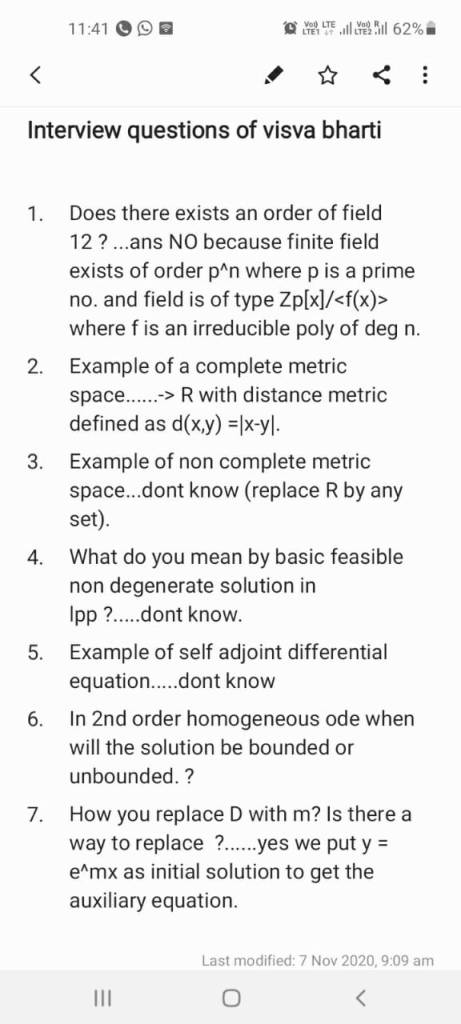 🎯 PhD Interview Questions & Suggestions Shared by ‘Prince Bharti’ (PhD Aspirant 2021 ). I admitted PhD in January 2021 session at Hyderabad Central University. I selected subjects for interview namely Differential equations and Fuzzy Theory. Because I do project in MPhil on Fuzzy Theory so it’s beneficial for me. They ask some questions about my project. And from Differential equations they ask from SLP and BVP , what is the difference between them, and example of these, and knowledge about boundary conditions that’s it. Thank you sir 🙏 📚 (Our Question) Any Suggestions from your Side… Yes sir according to me , interview k liye apna ek subject tyyar kr ke jana chahiye, or uske main main topics per command ho and given conditions , related examples ko dhyan se smajhna kafi halpful rhega. Jiska nhi pta use dheere se sorry bol de or apni pasand ka topic unhe bta do bss , ab aap tyyar rhe sb kuch usi me se poocha jane wala h😊😊 that’s it. Thank you sir. Ye bhi add kr lena, aapke notes kafi useful rhe mere addmission m , thank you very much sir 🙏 , isi tarah se hmari help krte rhiye … 🎯 PhD Interview Questions & Suggestions Shared by ‘Sanket’ (PhD Aspirant 2021 ). Recently I’ve appeared for VIT Vellore and BITS Pilani interview. Here I’m providing my Interview Questions in handwritten format… 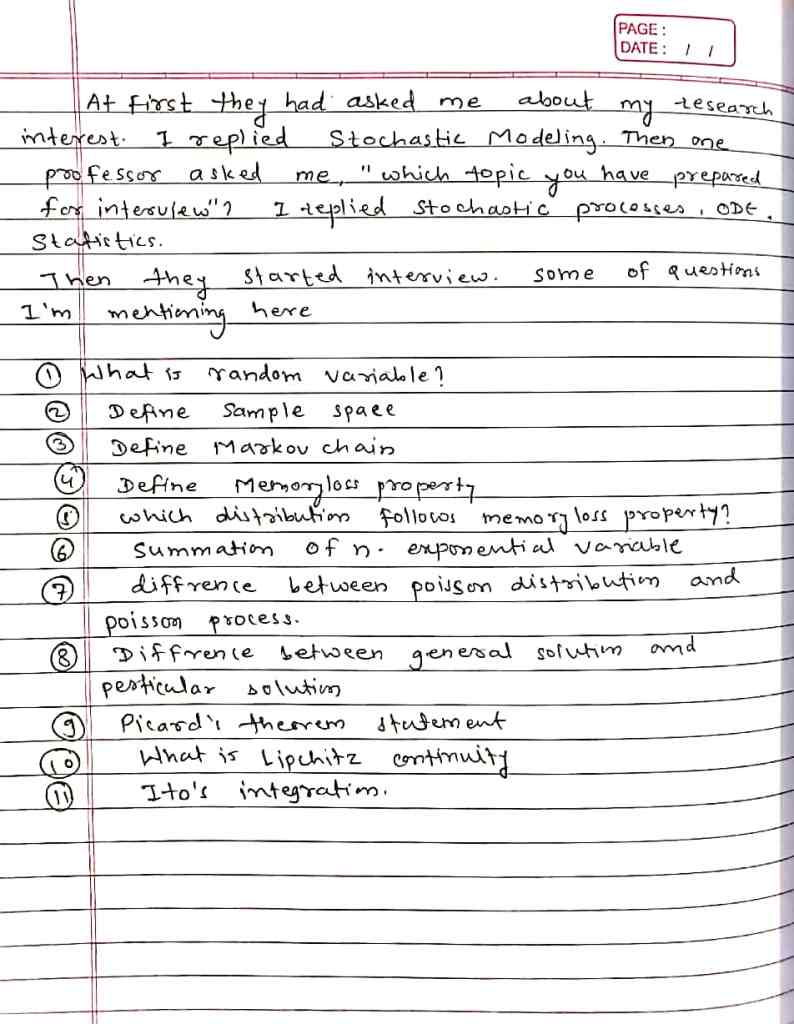 ” Just prepare some basics … Means whatever you are going to tell about research interests. Prepare basics nicely. Prepare one favourite theorem. Lots of example and counter examples” 🎯 PhD Interview Questions & Suggestions Shared by ‘Sanjeev ‘ (PhD Aspirant 2021 ). Hello sir I was asked few questions in Tezpur Univ phd interview
Thank you very much for providing useful tips and updating us on events happening in Mathematical world. Hello Sir…my suggestions are One may clear the competitive exams but clearing interview is completely different. We need to have good knowledge of topics. Must read standard books (including proofs) like Bartle for Analysis, Gallian for Algebra, etc. Avoid random guess because one wrong answer would expose all your weaknesses. If you don’t know the answer them simply say I can try try and after try if could not get answer then say that you don’t know the answer… Logical implications must be sound. Note: This page is under construction… Related Links:Share this:, 8 thoughts on “ phd & jrf position interview asked questions & experiences(collections) ”. Thanks a lot sir, but i have seen very less question about many IITs, like IIT Roorkee Because many of you usually not share the asked question. very very very nice and hepfull page Q Is there collection of the DU PHD Interview questions? Whether any computer science related questions for phd Thanks a lot sir. 🙏 I need to get new updates Leave a comment Cancel replyThis site uses Akismet to reduce spam. Learn how your comment data is processed . 
Announcement
AnnouncementsSyllabus for ms/phd interview, important information regarding interview. Candidates should show an aptitude for basic sciences like mathematics, physics and chemistry. Candidates may choose to attend interviews in one of the three panels given below. They are advised to prepare for the interview on few of the topics listed under the chosen panel. Please note that this is only an indicative list. Structures Panel:Syllabus for written test (Screening round) and interview Strength of Materials : Stresses, Strains, Stress-strain relations, Trusses, Beams ( SFD,BMD, Deflection of beams - Statically determinate ), Theories of failure, Thin walled cylindrical shells subjected internal pressure, Torsional problems. Composites : Classifications, Stress-strain relations, Material constants, Micro mechanics, Macro mechanics Aerodynamics and flight control Panel: ( for pdf file click here )Syllabus for written test:(Screening round) Linear Algebra: Vector algebra; Matrix – Matrix operations, Determinant, Rank of a matrix, Eigen values and Eigen vectors; System of linear equations. Calculus: Functions of a single variable and plots; Limit, continuity and differentiability; Mean value theorem; Local / Global maxima and minima; Sequences and Series; Taylor and Maclaurin series; Indefinite and definite integrals; Application of definite integral to find area and volume; Partial and total derivatives. Functions of complex variables – Roots, Analytic functions (Cauchy-Riemann equation). Differential Equations: First order linear and nonlinear ordinary differential equations (ODE); Higher order linear ODEs with constant coefficients; Cauchy-Euler equation. (It is presumed that the candidate is knowledgeable with high-school mathematics such as basic geometry, trigonometry, coordinate geometry and algebra, which are fundamental to the given syllabus for the mathematics test) Syllabus for interview:(Candidates shortlisted from written test) Note: Prepare few topics from below. Not expected to know all. Basics of Fluid Mechanics: Basic equations of motion, Classification of Flows, Flow past bodies, Vortex motion, Lift, Drag, moments. Basic Numerical Methods: Convergence, Stability, Finite difference Methods, Complex analysis, Differential Equations, Special functions, Programming Skills. Basic Gas dynamics: Wave Propagation, Mach Waves, Compressible Flows, Nozzle flows, Shocks, Expansion, Fanno flows, Rayleigh flows. Experimental Techniques: Measurement of Flow parameters - pressure, temperature, velocity, mass flow, flow visualization. Flight Dynamics & Control. Laplace transform, response of LTI, transfer functions, feedback systems, open loop and closed loop gains, types of systems, poles and zeros, state space form, stability, controllability, observability. Free body diagram, point mass model, Airplane performance, rigid body dynamics, trim and stability, static margin, longitudinal and lateral-directional dynamics, longitudinal and lateral modes. Propulsion Panel:Classification of Air Breathing and Rocket Propulsion, Working of turbojet, ramjet, Solid and Liquid Propulsion, Calculation of thrust, Equilibrium Combustion thermodynamics, Elements of Heat Transfer, Gas Turbine Engine Components. Experimental Techniques: Measurement of Flow parameters - pressure, temperature, velocity, mass flow; flow visualization. What is the procedure to enrol for a PhD at IITM? How to prepare for the interview?Dreaming of diving deep into a subject until you’re a pioneer of your field? IIT Madras offers one of the finest Ph.D programs in the country in Engineering, Science, Humanities, and Management disciplines, making it an excellent choice for aspiring researchers. Here are the eligibility criteria for each discipline: Engineering:
Humanities and Social Sciences:
Management:
There are other criteria that can be found here . The process of applying to Ph.D. programs at IIT Madras is entirely online, and through the research portal here . Don’t let the eligibility criteria scare you, it’s way less intimidating than you think! Shortlisted candidates possessing the minimum educational qualifications & eligible degree (as specified in the admission brochure ) will be called for a “test and interview” or “interview” by the Selection Committees of the respective departments, the details of which will be communicated via email. Most departments will specify the syllabus for the interview on the department website (as seen in the IITM Mathematics department’s website ). The test and the interview will assess the fundamentals and basic understanding of the subject. Hence candidates need to brush up on basic concepts. It is also important to look upon the questions where they went wrong in the test, as there is a chance that questions might be asked from that on the interview. Based on the academic record and the performance of the candidates in the interview and/or test, the Departmental Selection Committee will recommend suitable candidates for admission to the program. Related Topics
PhD Interview Questions and AnswersWritten by Mark Bennett Your PhD interview will be an important part of your postgraduate research application. This is your chance to meet your prospective department, discuss your project and show your potential as an academic researcher. Of course, it’s also when that potential is going to be assessed. You’ll need to show an awareness of what’s involved in a PhD project and prove that you have the right aspirations and approach to work on one for three (or more) years. You’ll also need to make it clear that this is the right university , department, research group or laboratory for you. None of this has to be especially intimidating. Putting some thought into your project and your choice of institution can make answering PhD entrance interview questions quite simple. On this page we’ve put together a list of the questions you might be asked at an interview. We’ve also explained why the university might be asking each question, and provided some tips on how to answer them You won’t necessarily be asked all of these questions – and you almost certainly won’t be asked them in the order here. Some of them also overlap with each other. But they’re all topics that you should prepare to discuss at a PhD interview . We’ve also included a selection of questions to ask during a PhD interview . Let's get you PhD readySign up to our weekly newsletter for the latest advice and guidance from our team of experts. Interview questions about youYour qualities as a researcher, team-member and individual are some of the most important factors in a university’s decision to accept you for a PhD. Regardless of your subject area, you need to be the kind of person who can dedicate themselves to a three-year project. You also need to be able to work alongside other students and academics in a positive and successful research environment. The interview is the best way for a university to assess this. Just as there’s more to doing a PhD than research and writing, there’s more to a prospective candidate than their academic record. #1 Tell us about yourself…This popular opener can feel like an awkwardly open ‘question’. You’ll be prepared to explain your project, to say what a great fit it is for the university, perhaps even reference some current research. But how do you ‘answer’ an invitation to introduce yourself? By introducing yourself. Your interview panel isn’t trying to catch you out here. They’re offering an icebreaker to help ease you into the rest of the interview. Obviously your response should be relevant to the occasion. But it doesn’t just have to be a presentation of your academic achievements, interests and goals (the interview will get to those in time!). Say a little about your background, where you’re from and what your interests are. Don’t be afraid to relate these to your academic specialism and your choice of university. If something specific inspired you to consider a PhD, mention it. If there’s something that’s attracted you to this city as well as the university, say so. (There’ll be plenty of time to talk up the institution and its research later).
#2 What made you choose to do a PhD?At some point in your interview your interviewers are going to want to know why you decided to do a doctorate. This may seem like a simple question, but be wary of giving an overly simplistic answer. Just pointing out that you’re good at your subject and a PhD seemed like the logical next step won’t be enough – especially if there’s a funding decision to be made. The panel is already satisfied that you’re academically capable and interested. You’ve demonstrated that by getting an interview (and turning up for it). Now they want to assure themselves that you’ve got the motivation and drive to see you through three or more years of hard work on a PhD project.
#3 What do you plan to do after you complete your PhD?It might seem strange for your panel to ask about your post PhD plans. After all, those don’t have any really impact on your ability to do a PhD, do they? And graduation is at least three years away in any case; should you have thought that far ahead? The answers to which are ‘yes’ and ‘of course you should.’ Universities want to make sure you’re doing a PhD for the right reasons (as above). Asking about your future plans is a great way to check this. Students who ‘sleepwalk’ into a research project are much more likely to come unstuck or lose motivation when the going gets tough later on. This doesn’t mean you have to have everything worked out, or that your ambitions have to be unique. If you're planning to apply for a post-doc after your PhD, say so. But demonstrate an understanding of academic career paths – and show that you’ve put some thought into alternatives. It’s also the case that not everyone who gains a doctorate will go on to an academic job. Universities want to recruit PhD students responsibly and provide the kinds of skills and training they actually need. So, don’t feel that you have to want to be a scholar to be accepted for a PhD. Research training can prepare you for a range of career paths . An appreciation of these will impress your interview panel. (Particularly if you’re applying for a professional doctorate ).
#4 What are your strengths and weaknesses?A well-worn question, but a great opportunity to reflect on your abilities - as well as opportunities for further development during your PhD. What your panel is really interested in is not so much what your strengths and weaknesses actually are , but your ability to identify them. In practice, this means giving solid examples for strengths and showing how they relate to the PhD project you have in mind. Don’t just say you’re a good time-keeper. Point out when you’ve had to be well organised and show that you understand the importance of self-directed study to a successful PhD. When it comes to weaknesses, maintain the right balance. A PhD interview probably isn’t the best time to wallow in existential self-doubt (unless you’re applying for a very specific topic in Philosophy). Equally though, answers like ‘my only downfall is excessive perfectionism’ can sound a bit contrived. If the panel is asking you about strengths and weaknesses, they want you to identify and reflect on both. Be honest about the things you find challenging, but identify them as training needs and discuss how you expect to improve upon them as part of your PhD.
#5 Are there any training needs you can identify ahead of your PhD?This question (and its answer) can be part of an invitation to reflect on your strengths and weaknesses (as above). But, you may be asked about training needs more specifically. This is likely if you’re applying to a more structured programme, within a Doctoral Training Partnership or similar. Either way, this is a great opportunity to reflect on your aspirations as a researcher and show that you’ve read up on the project you’re applying to. If the university offers a series of training modules, mention them. Say what you hope to gain from them and how you think they’ll help you succeed in your PhD. You might also want to refer to any discussion of your aims and aspirations with a doctorate. If you’re keeping an open mind about non-academic career paths, show an awareness of the transferrable skills this PhD can give you. And don’t worry about revealing a few gaps in the core skills required by your discipline. A PhD is a training process, not a three-year exam.
Interview questions about your PhD projectThis is the university’s chance to further assess your suitability for an advertised PhD position, and the likely fit between your planned project and the expertise it has available. It’s also your chance to expand on your research proposal and show that you have the skills, experience and understanding to complete a doctorate. For funded places (or other competitive projects), this is the time for you to prove that you are the best student for this PhD. It’s a good idea to reference your research proposal (or other appropriate parts of your application) when answering these questions. But expand upon what the panel has already read. (And make sure there isn’t anything in that proposal that you aren’t confident enough to ‘back up’ in your interview!) #6 Why this project?The exact focus of this question will depend on whether you’re applying for an advertised PhD project (more common in Science, Engineering and Medicine) or proposing your own research within a department's PhD programme (more common in Arts, Humanities and some branches of the Social Sciences). If you’re being considered for a pre-defined project, make sure you know it inside out. Say what it is that interests you about it. Compare it to similar projects (if appropriate) and explain your particular choice. If you’re proposing your own project, this is your chance to show some passion and enthusiasm for it. Refer to your research proposal and take the opportunity to discuss and expand upon it. In both cases you should point to some existing scholarship and show an awareness of the field you’ll be entering. You’ll also want to re-iterate what makes your project distinctive. After all, the PhD is defined as offering ‘an original contribution to knowledge.’ This doesn’t mean preparing a comprehensive list of key works or current research projects (that ‘literature review’ will be one of the first things you do on the actual PhD). At this stage the panel just wants to see that you understand your proposed project and are enthusiastic enough to see it through. Depending on how the question is phrased, you may also discuss your choice of university at this stage – or explain why your previous work makes you a good fit for this particular PhD (see below).
#7 What makes you the right candidate for this PhD?If you’re applying for a pre-defined PhD project , you’ll almost certainly be asked why you are the best candidate to undertake it (especially if there’s funding available). Remember too that some of these projects aren’t automatically funded. Their financing can depend on the quality of the student they attract, so your panel will be very keen to make sure you’re going to be ‘Dr Right’. You might still be asked about your suitability for a self-proposed PhD (in Arts or Humanities, for example). This is another way for your interviewers to assess those all-important motivation and commitment factors. Whatever your situation, this is a good place to talk a bit about your previous work at undergraduate or Masters level. The panel already knows the grades you received, but now you have the chance to talk about what you actually did on those degrees. Show passion and give examples. If an undergraduate module on gothic literature inspired you to propose a PhD on an under-researched aspect of eighteenth-century culture, say so. If your Masters has given you skills in exactly the kind of statistical analysis required by this doctorate, mention that.
#8 What difficulties do you expect to encounter during this project?This is another fairly popular question topic. It might form part of a discussion of your strengths, weaknesses and training needs. Or you might be invited to speak more specifically about the challenges involved in your project. The panel isn’t trying to catch you out here, so don’t be afraid to speak frankly. All projects involve their own potential pitfalls and complications. Overcoming them will be part of completing a PhD; recognising them will show that you're ready to begin one. Show that you’ve put some thought into the approach necessary for your research and the methodology you might use. Don’t be afraid to identify problems you aren’t yet certain how to solve (the best way to organise some data, the authors to include in your initial survey of texts, etc) but suggest how you might go about investigating them. This is also a good time to mention any training needs (if you haven’t already) and speak about how you plan to take advantage of development opportunities within your programme.
#9 What would you like the impact of this project to be?‘Impact’ is an increasingly important factor in academic work and this applies to PhD research too – especially if you’re funded. Even if your panel doesn’t explicitly ask about impact, it’s a good idea to mention what you hope the wider outcome of your project might be. If you are asked this question – and are prepared for it – this is a great chance to get a leg up on the competition. Impact essentially refers to the measurable effects of research outside academia. It’s a given that your PhD will have an effect on future work in your field. But universities are increasingly focussed on the benefits of their work beyond the ‘ivory tower’ of higher education and research. This is particularly important if your project is funded. The money supporting your studies will probably have come from public revenues (via a Research Council studentship) or from a large charity or trust. Those organisations will want to make sure their investment is worthwhile. Examples of impact differ a bit between fields. If you’re in the Social Sciences you may already have some idea of the ‘outputs’ from your project. These could be educational workshops, policy guidance, etc. If you’re in Science, Medicine or Engineering you’ll hope to provide economic benefits to industry or to healthcare. Arts and Humanities PhDs can have impact too. Think about the ways in which you could take part in public engagement, such as teaching people about local history or archival resources. You could partner with local schools, or even media companies producing documentary work.
#10 How will you fund this project?This question is obviously more likely in interviews for non-funded PhDs. (It would be somewhat strange for a university to ask you about funding for a project that carries a full studentship). However, you might still be asked about contingency plans if funding falls through (particularly if funding hasn’t been secured at this stage) or if your project over-runs. Self-funding students will obviously need to go into more detail here. It’s not the responsibility of your university to ask for a complete breakdown of your finances (or for you to provide one). Yet the panel will want to be sure that you understand the cost involved in doing a PhD and have some kind of plans in place. It’s fine to say that you’ll be looking for extra funding and part-time work as you start the project. But make it clear that you’ll still have enough time to apply yourself to the actual research.
Interview questions about your choice of universityUnsurprisingly, your interview panel will be interested to know why you’ve chosen their university for your PhD. If proposing your own project you’ll be asked about the fit between your research aims and the expertise of the department you’d be entering. If applying to a pre-defined PhD, you’ll be invited to explain why this laboratory or research group particularly appeals to you and what you yourself can contribute to them. Preparing for these kinds of questions is actually quite easy. Read up on your prospective university, department and supervisors. Show that you’re aware of the kind of work they do and give examples. Feel free to mention other aspects of the university that appeal to you – its reputation, its alumni, even its location – but keep the main focus on the fit between your work and their research environment. #11 Why have you chosen to study a PhD at this university?Whatever else your panel asks, you can be pretty sure a question about your choice of university and department will crop up at some point in a PhD interview. Your answer gives you the opportunity to do several important things. Most obviously you can talk about the university and its research. Explain why you’d like to study with these supervisors in particular, when you’ve used their work during your Bachelors degree or Masters (if relevant) and how you can contribute to their future projects. This is also an opportunity to reiterate your awareness of the wider research context for your project. If other departments or laboratories are undertaking related work, mention that. Say what attracted you to this university in particular and what you hope to achieve as one of its students. If your PhD is part of a structured Doctoral Programme (as is increasingly likely) you can touch on any training and development opportunities it includes. You may mention these elsewhere in your interview, but make sure to include them when speaking about the university’s appeal to you. Finally, show an awareness of any relevant research facilities, resources or collections. Does the university hold a unique archive? Suggest how it might support your investigations. Has the laboratory you’re working in been equipped with any new facilities? Show that you know about them and are interested in using them (as relevant). Universities spend a lot of money on facilities and resources. They want students – particularly postgraduate researchers – who will make use of them.
#12 What can you bring to this research group?PhD candidates are more than just students. You’ll function, in many ways, as a junior academic working within a wider research environment. You’ll network with other students and academics. You’ll probably teach undergraduates. You may even publish some of your research (independently, or alongside your supervisor). This means that your potential contribution to a department or laboratory is, in many ways, just as important as what it can offer you. If you’re asked a question about this, take the opportunity to sell yourself a little. Talk about your experience (academic or professional) and outline your ambitions. Make it clear that you will provide a return on the time, money and resources that the university is considering investing in you.
What to ask in a PhD interviewYour PhD entrance interview will probably end with an invitation for you to ask your own questions of the panel. This part of the interview is as important as the answers you'll have already given. Asking good questions demonstrates your motivation. It also shows that you’ve given some genuine consideration to the project and / or programme you’re applying to. Don’t just ask questions ‘for effect’ though. This is your chance to find out more about the project you’ll be doing, the people you’ll be working with and the expectations of you as a PhD student. Remember: you’re a good student, with lots of potential. You’re considering at least three years of hard work with this university. You need to know that you’ll get on with your supervisor, that your work will be appreciated and that there are good prospects for your project. You’re here to be interviewed for a PhD, but nothing’s stopping you from doing a little interviewing of your own. Here are a few good questions to considering asking at your PhD interview. They include ways to express enthusiasm for your project, as well as some useful inquiries to make for yourself: What will the supervision arrangements be for the project?This shows that you’re thinking practically and looking ahead to the process of actually doing the PhD. It’s also something you’ll probably want to check for yourself. What kind of training and skills sessions are offered as part of the PhD programme?This shows that you’re interested in the development opportunities that form part of a modern PhD. It’s also a good way to address any concerns you have about your own skills. Be careful though. Avoid asking simple questions about material that’s already covered in the PhD project description, or in the university’s postgraduate prospectus. Will I have opportunities to teach / present / publish?This is something else you’ll want to know for yourself, but it also demonstrates a practical approach to your PhD (and future career). A good PhD programme should offer some opportunity to teach or demonstrate towards the end of your project. Equally, you should be encouraged to communicate your research and supported in doing so. How many other PhD students has this supervisor seen to completion?Don’t be afraid to ask about previous students and what they’ve gone on to do. You may also want to know if you’ll be working with or alongside other students and what the arrangements for that will be. Are there likely to be any changes to the funding arrangements for the project?A good practical question. If you’re applying for a funded place, make sure you understand the terms of that funding (its duration, whether you can combine it with any other income, etc). If you’re currently self-funding, it won’t hurt to ask if the university anticipates having any support available for you in future. Is the university or department likely to run any events or other associated projects during the period of my PhD?This might not seem like an obvious question, but it’s worth asking. The university might be in the early stages of planning a major hosted conference, external partnership or outreach project. Asking about these shows a genuine interest in your university and its research and suggests that you’ll be the right sort of PhD student to help deliver them. Needless to say, these kinds of projects are also excellent opportunities to gain experience and build your CV. Other questions will probably occur to you according to your specific circumstances and the nature of the project you’re applying to. Focus on the things that would concern you as a student actually doing the PhD in question, but avoid trivial topics. Your panel will be happy to talk about library resources and lab facilities. They’ll be less keen to advise on the best local pubs or say how often the bus runs between campus and town. Also try to avoid asking for information that’s readily available elsewhere. This suggests you haven’t done your research – which is never a good sign when applying to do research. Still looking for that perfect PhD project?While you're preparing for the interview stage of applications, it's a good idea to keep searching as many PhD projects are advertised throughout the year . Our postgrad newsletter shares courses, funding news, stories and adviceYou may also like....  Are you preparing for a PhD interview? Learn some of the do's and don'ts from our expert who has been through the process to help you ace yours.  Holly is officially coming to the end of her first year of PhD study. She talks to some other students to compare experiences and lessons learnt along the way.  Our guest blogger, Holly sat down with an expert on Imposter Syndrome to find out what it really is and how to tackle it.  A PhD is a great way to help you make a difference. We spoke to Josephine Agyeman-Duah about her PhD journey to improve outcomes for babies born preterm.  PhD Hard-talk is an online community for postgraduates and researchers to share their work and advice. We sat down to chat with the project founder, Noma Mguni to learn what PhD Hard-talk can do for you.  After winning our PhD Supervisor of the Year Award, we caught up with Clive Palmer to see how he got to where he is now and what life is like as a supervisor. FindAPhD. Copyright 2005-2024 All rights reserved. Unknown ( change ) Have you got time to answer some quick questions about PhD study? Select your nearest cityYou haven’t completed your profile yet. To get the most out of FindAPhD, finish your profile and receive these benefits:
Or begin browsing FindAPhD.com or begin browsing FindAPhD.com *Offer only available for the duration of your active subscription, and subject to change. You MUST claim your prize within 72 hours, if not we will redraw.  Do you want hassle-free information and advice?Create your FindAPhD account and sign up to our newsletter:
 Create your accountLooking to list your PhD opportunities? Log in here .
find your perfect postgrad program Search our Database of 30,000 CoursesDos and don’ts of a phd interview. Studying for a PhD is an amazing academic achievement, as well as serious time commitment , and it's certainly not one for the faint-hearted. Once you've decided to embark on this academic path, your PhD interviewer needs to be sure that you are able to rise to the challenge and are academically capable of achieving this ultimate goal. And the PhD interview is how they assess your potential for a place on the program when applying for a PhD . Your PhD interview will consist of questions that will enable your potential supervisors to get to know you better and have an understanding of what you’d like to study, why you’ve chosen your field of study, and whether you’d be a good fit for the PhD program. This interview will also give you the opportunity to ask questions about the program and the university to make sure it’s the place you’d like to study. Here, we've compiled a list of dos and don'ts of a PhD interview from the interviewer's perspective, to hopefully guarantee you success when answering the PhD interview questions and thus beginning your Doctorate journey. PhD interview questions to help you prepareYour interviewers will ask a range of different questions in order to determine whether you will be let into the PhD program . They will ask different types of questions to get an idea of who you are, what your interests are, and how much of an asset your research will be to the university. General PhD interview questionsOne important aspect of the PhD interview is for the interviewers to get a good idea of who the interviewee is. They will do this by asking a series of questions that are more general to try and get a sense of your likes and dislikes, and your overall personality. These opening questions could be viewed as ‘warm up questions’ and are likely to also include questions and discussions about your academic history, reasons why you are interested in your particular research topic, and why you’re studying a PhD. Example questions could include:
The PhD interviewer will ask you questions about your motivation to study a PhD, which you should find straightforward to answer as you clearly have a keen interest and knowledge in a particular research topic to be considering studying it at PhD level. Now all you need to do is illustrate to the interviewer why you are the right person for this PhD at their university. The first way to do this is to go into detail about your personal motivations for studying a PhD. Do you have a historical or family link with this topic? Was it an area you covered in your bachelors degree that you now want to explore further? Are you destined for a career in academia? Another thing you should demonstrate in your PhD interview is what experience you’ve had either academically, personally or in the workplace that has strengthened your passions for your research. It is also important to show that you have researched the university, the supervisor and your project. If many universities offer this particular PhD course, then why did you choose this specific one? Do they have resources that will be useful? Is there a supervisor you’d like to work with? Example questions that you can expect to receive at this stage in your PhD interview could include:
Relevant experienceYour PhD interviewer will be interested in any relevant experience you have to qualify you to study this PhD. Use your answers to draw attention to your specific qualifications that may not be obvious from your CV or project. Discuss other courses that you’ve taken, past research, etc. Use this time to reassure your prospective supervisor that you have the skills and experience needed to undertake a doctorate. Consider what is the critical knowledge and skills needed for this project and explain to the interviewer how you meet these. Don’t just summarise your CV as the interviewer has already seen this. They will want to see your passion and motivation for your research project. Example questions they may ask at this stage could be:
Your PhD projectInterviewers will want to know that students understand their project and the research involved in successfully studying a PhD. You should be prepared to discuss your project idea in detail and demonstrate to the interviewer that you are the ideal candidate. For example, you should explain that you understand the current gaps in knowledge around your topic and how you propose to fill these gaps. Show that you know what your aims and objectives are and how your efforts will contribute to the research field. Here are some example questions to help you discuss your PhD project:
Future ambitionsIt’s important for students to know where their work may lead them. Knowing how a PhD will help achieve this, and articulating these aspirations to the interviewer, will give the interviewer a better picture of the student’s goals. If the goal is to have an academic career, use this as an opportunity to show the interviewer that you understand the academic career path. An example question at this stage could be:
Your own questionsAs well as being properly prepared to answer questions about your PhD proposal, it is also important to ask your own questions to the interviewer to make sure that this is the university and PhD program that you’re looking for. Example questions that you could ask a potential supervisor could include:
PhD interview questions: DOs
PhD interview questions: DON’Ts
Summary of PhD interview questionsThis table shows some examples of different categories of questions you might enounter at a PhD interview.
Related articlesApplying For A PhD How To Prepare For A PhD Viva Are You Ready For A PhD? How To Get The Most From Your PhD Supervisor Common PhD Myths Alphabet of PhD Study Postgrad Solutions Study Bursaries  Exclusive bursaries Open day alerts Funding advice Application tips Latest PG news Complete Our Destination Survey Take 2 minutes to complete our Destination Survey for the chance to win a Postgrad Study Bursary worth £2,000. All we need to know is:
 |
IMAGES
VIDEO
COMMENTS
Before coming to the interview, a student should have answered hundreds of similar questions. They can be found in reputable textbooks, and over the web (see some popular job interview sites). These questions need to be solved in entirety. We often ask students to go to the board and write the answer.
In this video, I discuss some tips to help students who are going to sit for PhD interviews.I highlight the thought processes behind the technical questions ...
A lot of PhD applicants have asked for my PhD interview advice. A proper guidance and support can achieve you success. Sumit Rai has shared his PhD intervie...
IIT Delhi PhD Interview Experience. In this article, I have listed all the questions in order I was asked in my PhD Interview at IIT, Delhi for Computer Science. I have added notes on my answers as well so you can prepare along the way. Overall, Interview took over 1.5 hour and was very intense to face in person.
Yes, preparation is required to clear the Ph.D. interview and written test! Unfortunately, most of the candidates who appear for the interviews do not seem to understand how to prepare for these interviews. By preparation, we do not mean just "reading" through the textbooks and recalling the definitions. You should have understood the ...
Be the part of our different programs here: https://sites.google.com/view/physicsbyiitians/homePGP: https://sites.google.com/view/physicsbyiitians/pgpIGP: ht...
We would like to show you a description here but the site won't allow us.
Most PhD applications include an interview. This allows your university (and perhaps even your prospective supervisor) to discuss the PhD with you in more detail. This article lists some of the most common PhD interview questions along with their answers. The goal is to help you prepare for a PhD interview and pass with flying colors.
Indian Institute of Technology Madras. 4th December 2020. Procedure for Direct PhD interviewsThe aim of the interview process for Direct PhD candidates is to assess the knowledge and problem solving ability of the candidate in subjects that are fundamental to Computer Science and Engineering, and to assess the independent thinking ability and ...
At IIT BHU, the interview duration was about 15 minutes. They are always going to ask you questions from X-ray diffraction in condensed matter physics. Written & Interview Procedure; Few of the IIT's like IIT Kanpur and IIT Bombay, they take your interview once you qualify the written test. I have given the written test for both the institutes.
What are you looking to get out of a PhD? Be able to explain your past research. Have a 5, 10, and 30 min talk prepared. Be able to speak about your research to someone who isn't part of your field. I worked in a bacterial genetics lab and had to explain my research to people who worked with human cells and fruit flies.
To ace your Ph.D. program interviews, prepare to answer—and ask—these key questions. You've made it to the last step of the Ph.D. application process: the interview. Congratulations! But amid the excitement and butterflies, don't neglect the crucial next step: preparation. Grad school interviews—in which aspiring graduate students meet ...
🎯 Ques asked at IIT Delhi PhD Interview (Shared by Jasveen Kaur, August 2023). (Added on March 31, 2024) ... "Last I got a mail from IIT Ropar I selected in Phd program, your collection of question give me idea how to prepare for interview, Thank you so much from bottom of my heart. I have question that they ask during my interview. I am ...
HOW TO PREPARE FOR A PHD INTERVIEW? A VIEW BY IIT BOMBAY | https://youtube.com/c/facultyplusguide?sub_confirmation=1Hello, please SUBSCRIBE TO THE CHANNEL:Hi...
SYLLABUS FOR MS/PHD INTERVIEW Important Information Regarding Interview. Candidates should show an aptitude for basic sciences like mathematics, physics and chemistry. Candidates may choose to attend interviews in one of the three panels given below. They are advised to prepare for the interview on few of the topics listed under the chosen panel.
A formal question and answer session in front of a postgraduate recruitment panel. A presentation, based on your research proposal or area of expertise. A one-to-one discussion with your prospective supervisor. An informal lunch with your prospective supervisor, other members of your interview panel and / or current PhD students.
(for Written Test and/or Interview). Aerospace Engg. Shortlisted Candidates Declared. Check your status in the 'Online Application Portal' Biosciences and Bioengineering. Shortlisted Candidates Declared. Check your status in the 'Online Application Portal' Candidates List Updated Letter From HOD Research Topic List Updated Project Preference ...
The test and the interview will assess the fundamentals and basic understanding of the subject. Hence candidates need to brush up on basic concepts. It is also important to look upon the questions where they went wrong in the test, as there is a chance that questions might be asked from that on the interview.
Be honest about the things you find challenging, but identify them as training needs and discuss how you expect to improve upon them as part of your PhD. Do answer: I feel that I'm a good written communicator. My existing academic and professional work demonstrates an ability to put forward ideas clearly and concisely.
Preparing for a PhD interview is perplex. One need to have a good focus and determination to conquer it. A proper guidance and support can achieve you succe...
PhD interview questions to help you prepare. Your interviewers will ask a range of different questions in order to determine whether you will be let into the PhD program. They will ask different types of questions to get an idea of who you are, what your interests are, and how much of an asset your research will be to the university. ...
In this video I talk about the secret sauce for PhD interview success and I have example PhD interview questions and answers!Link to newsletter: https://acad...
He i have shared my interview experience at iit kanpur for phd admission. This was my first ever phd interview and i was very scared about this... so here is...